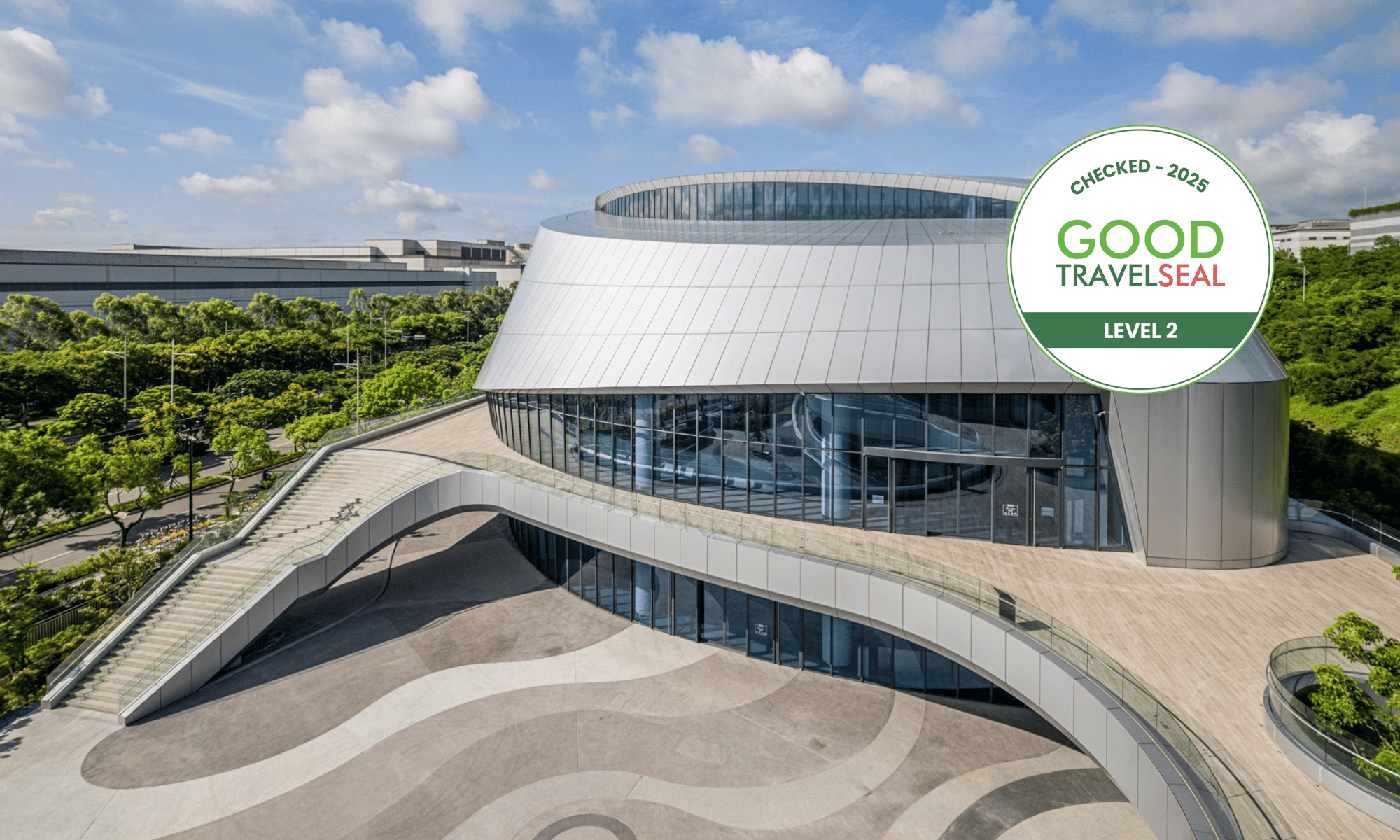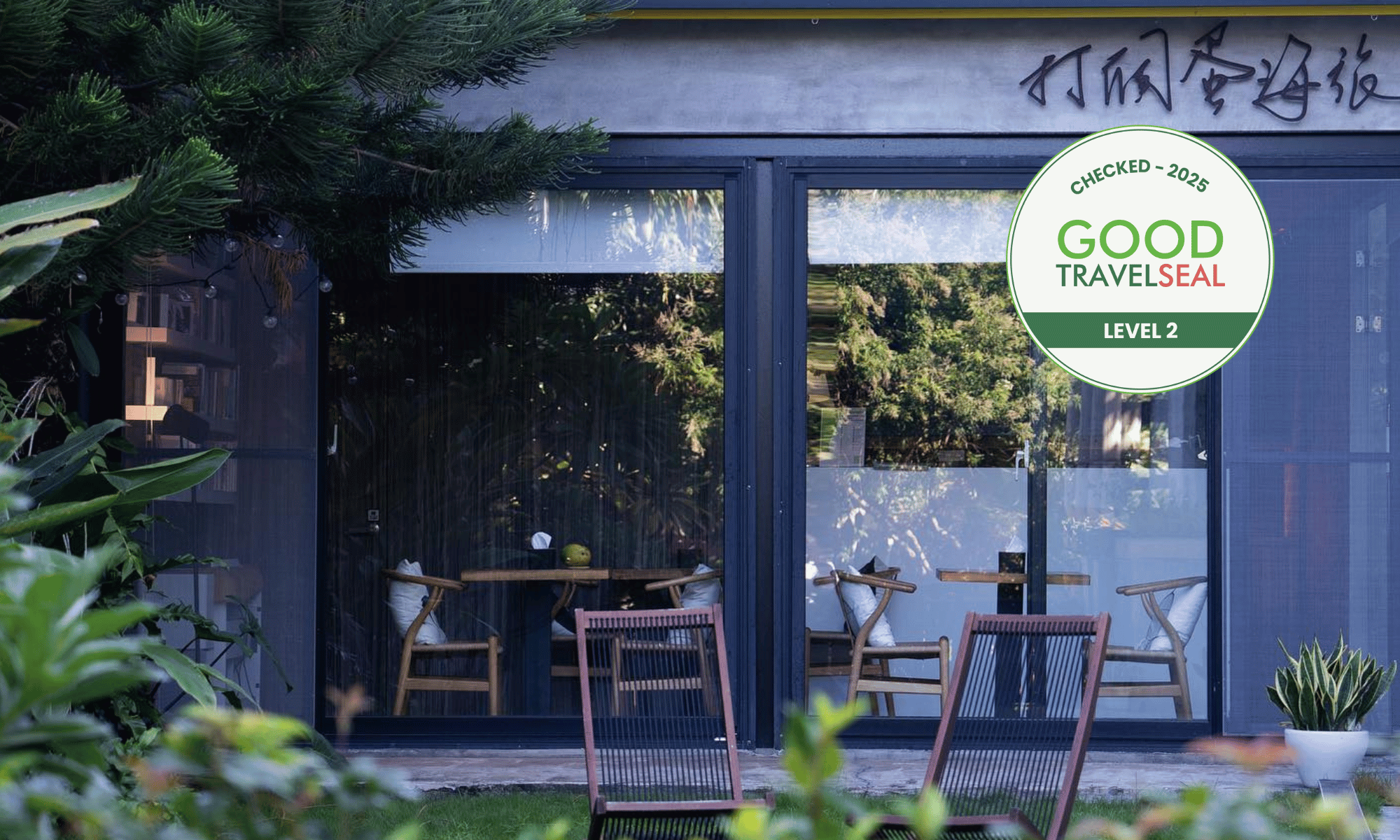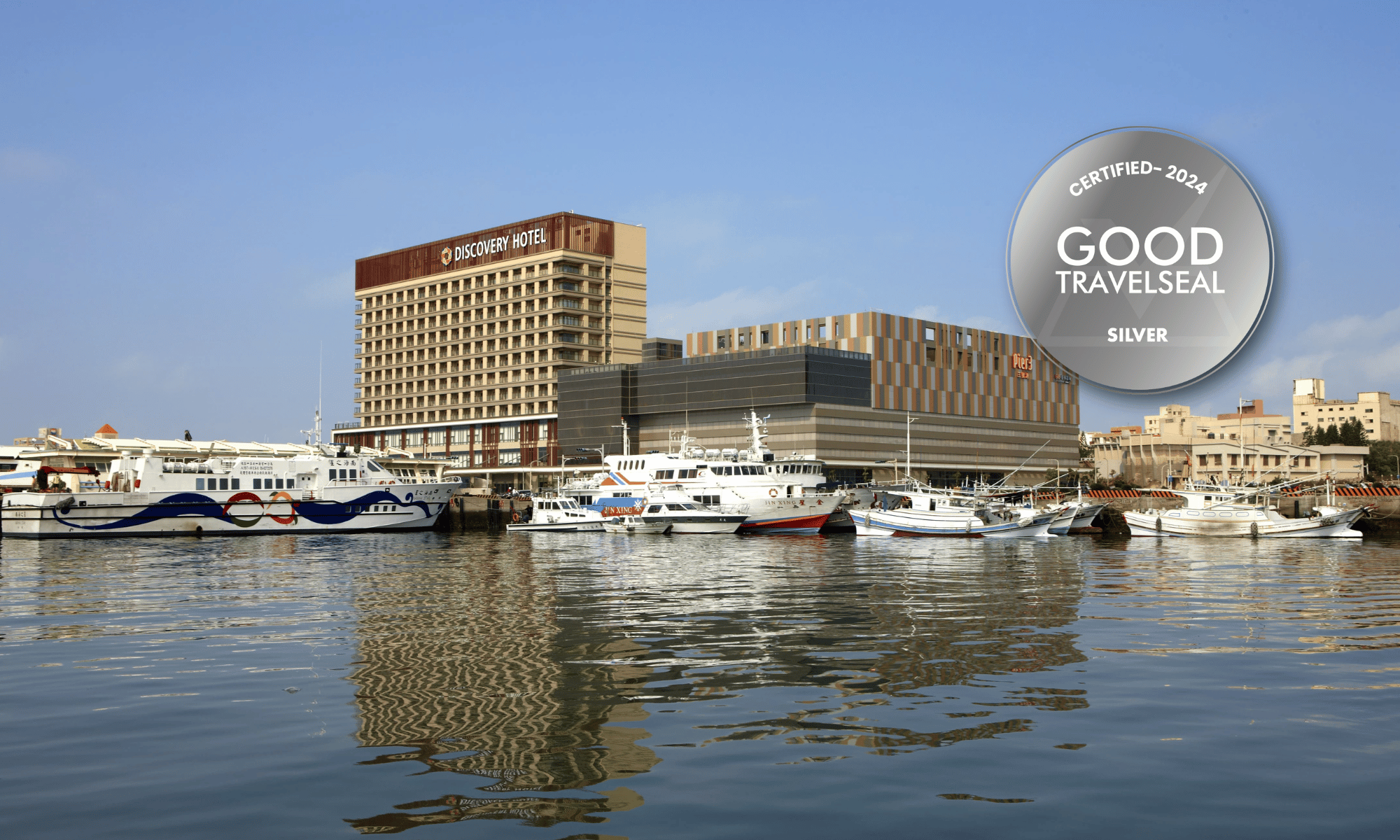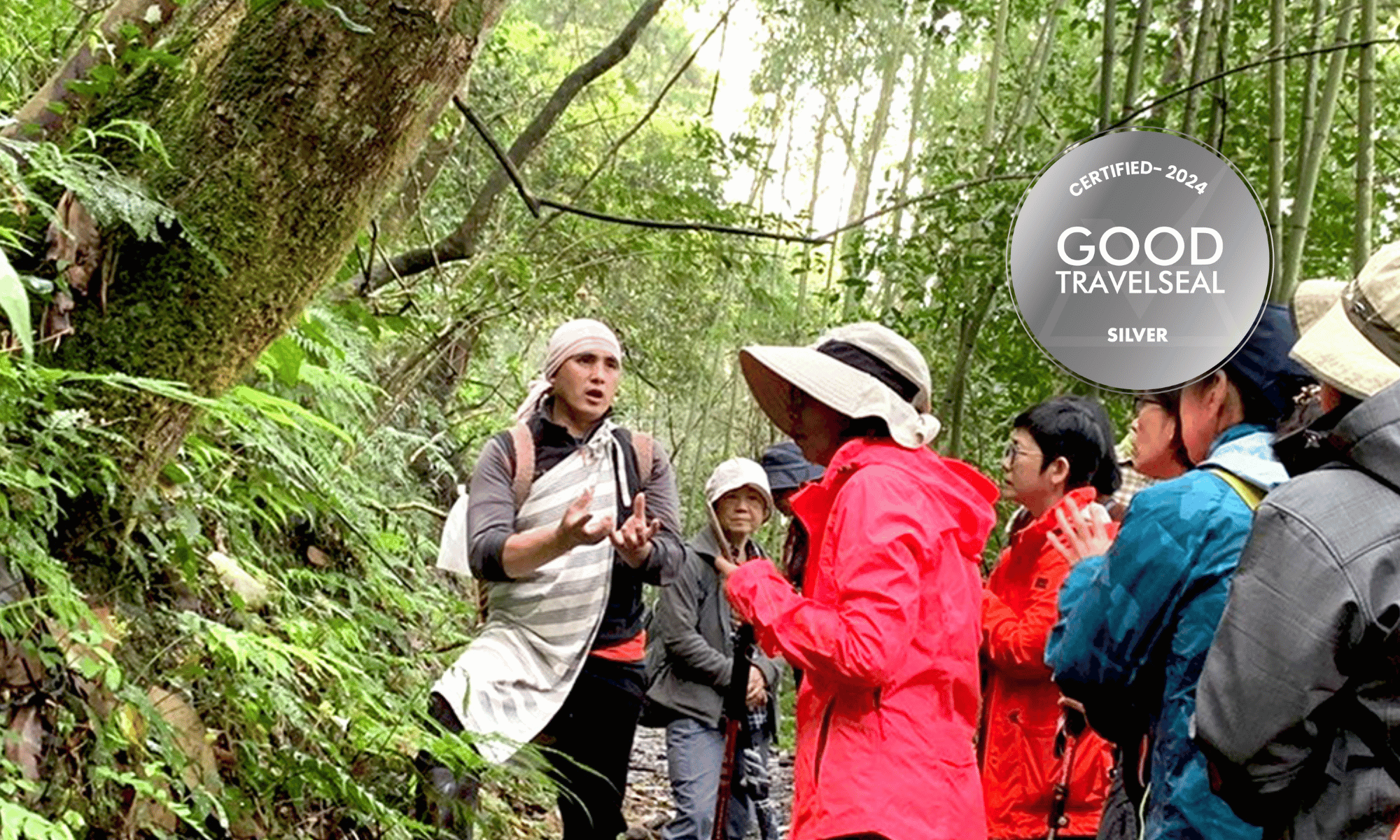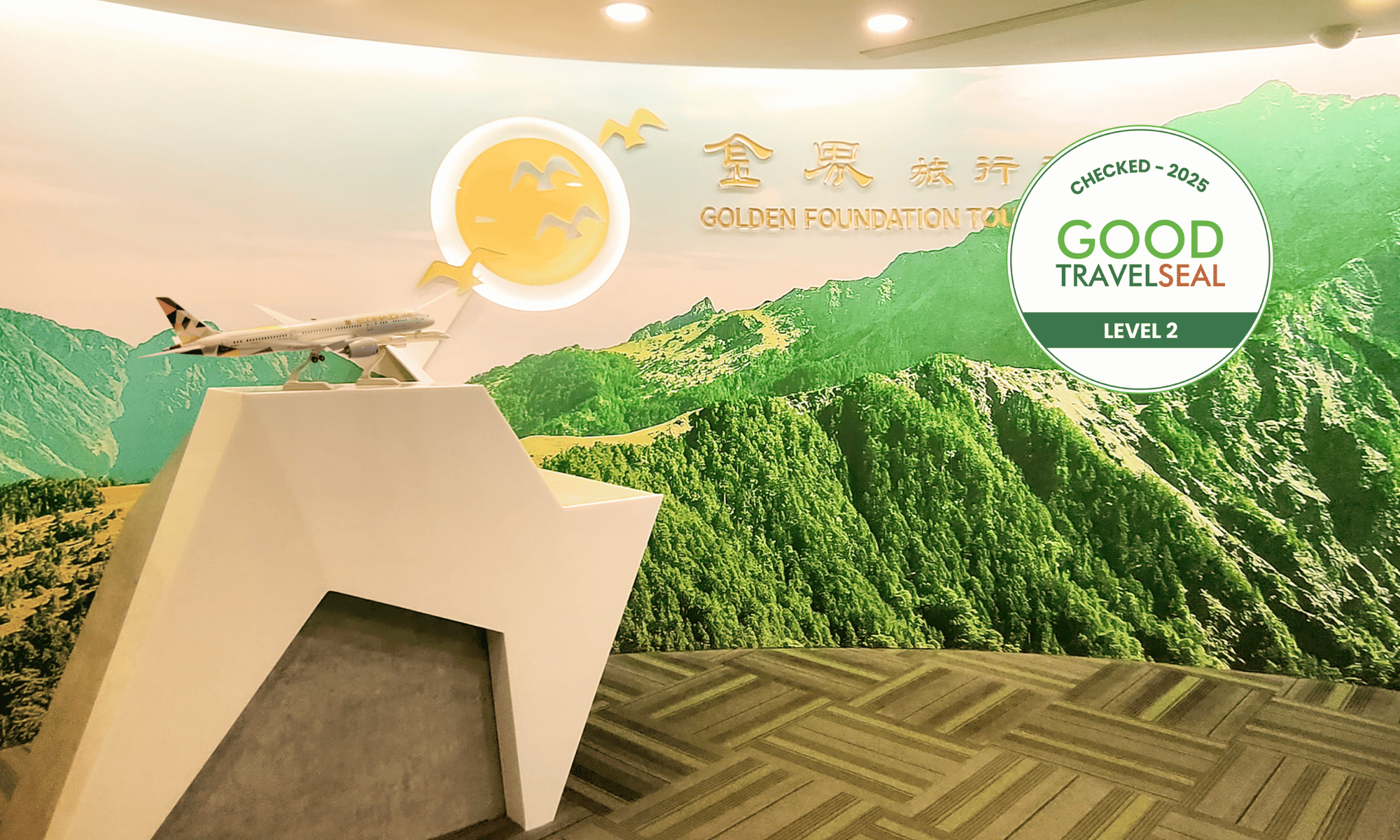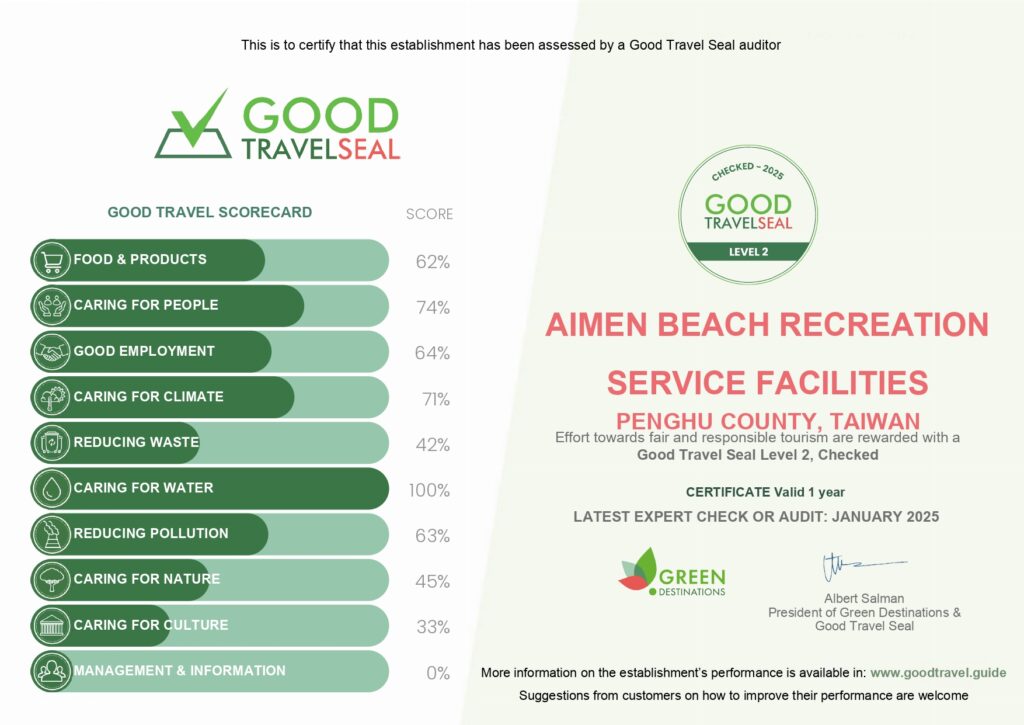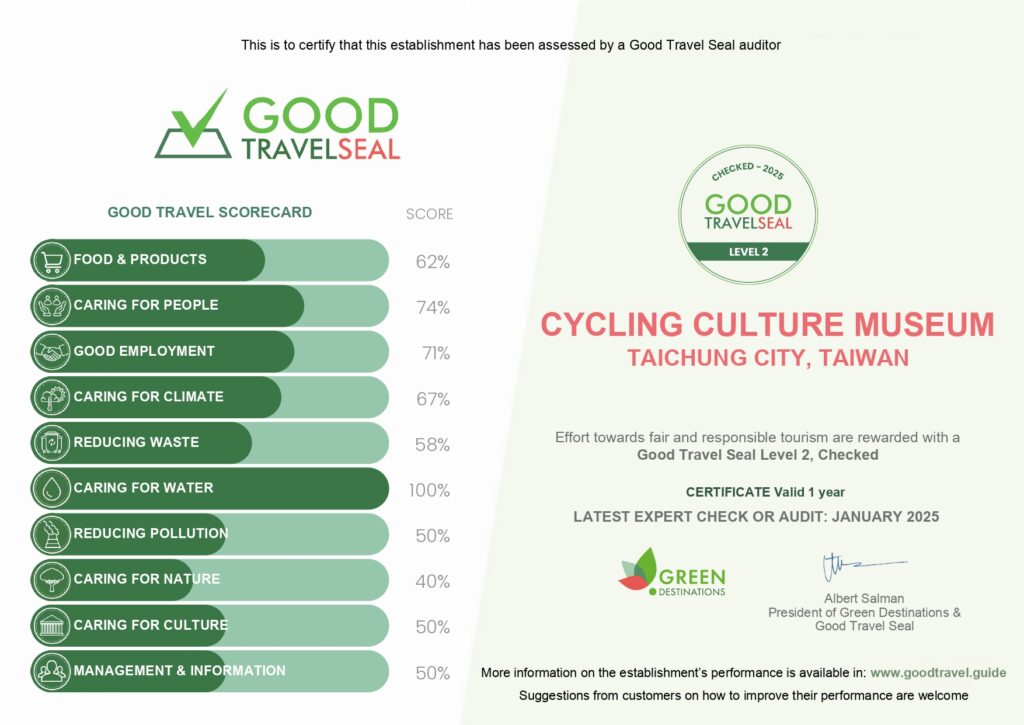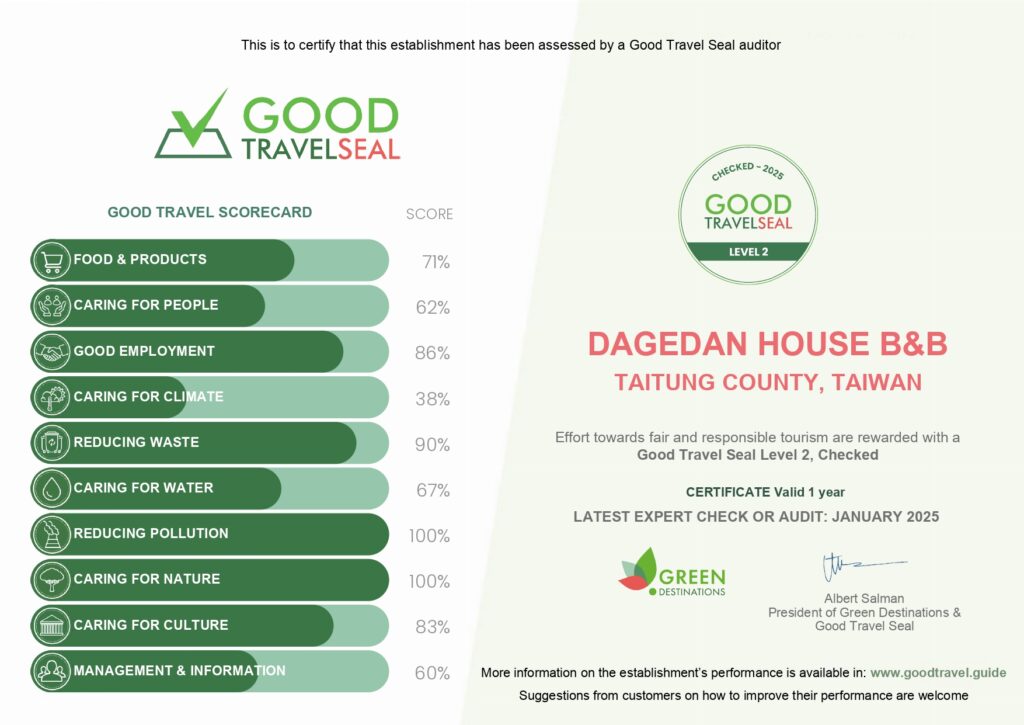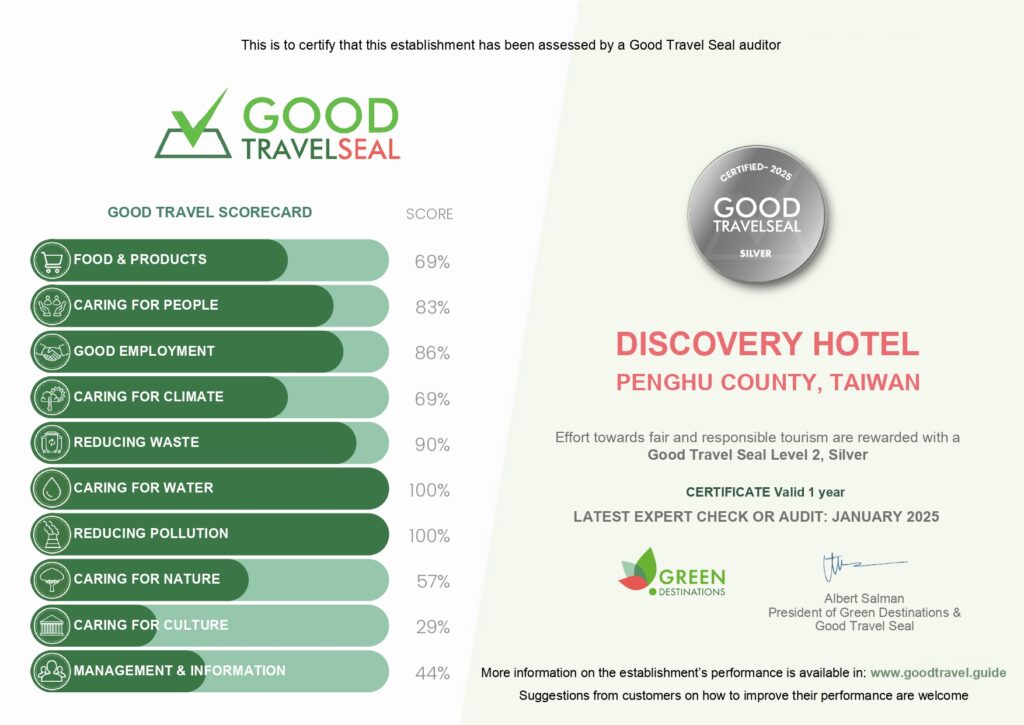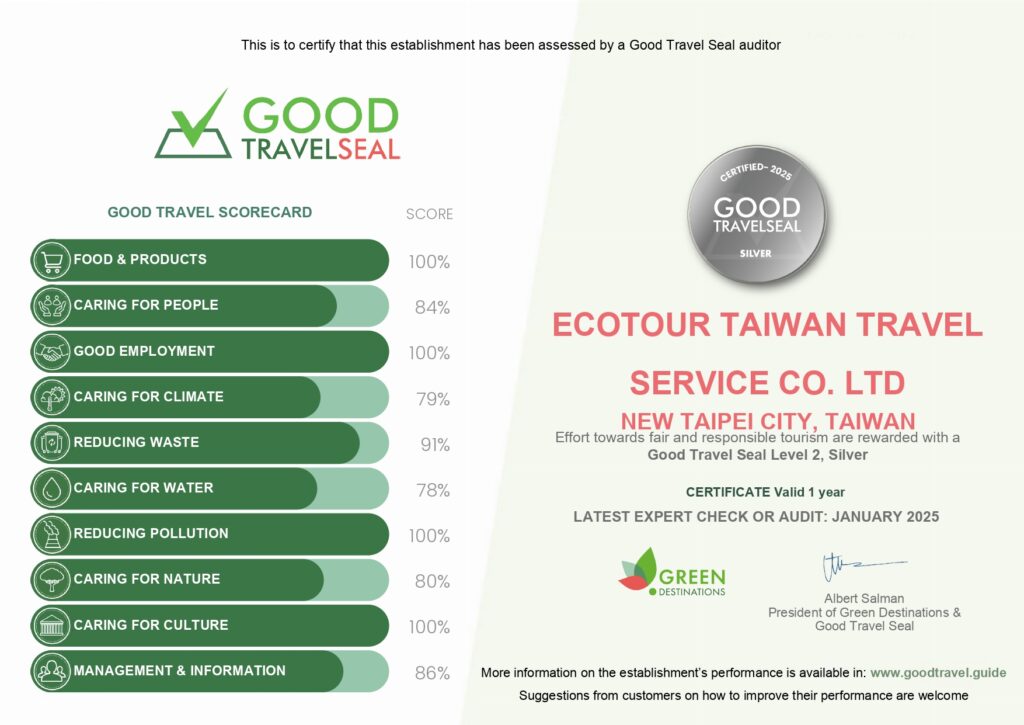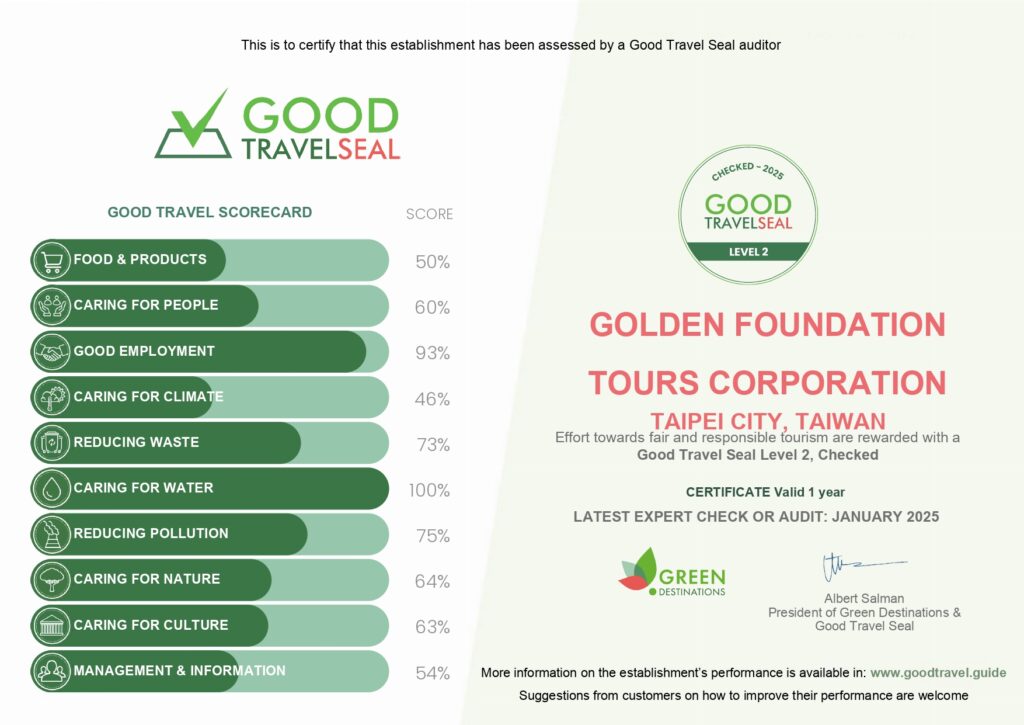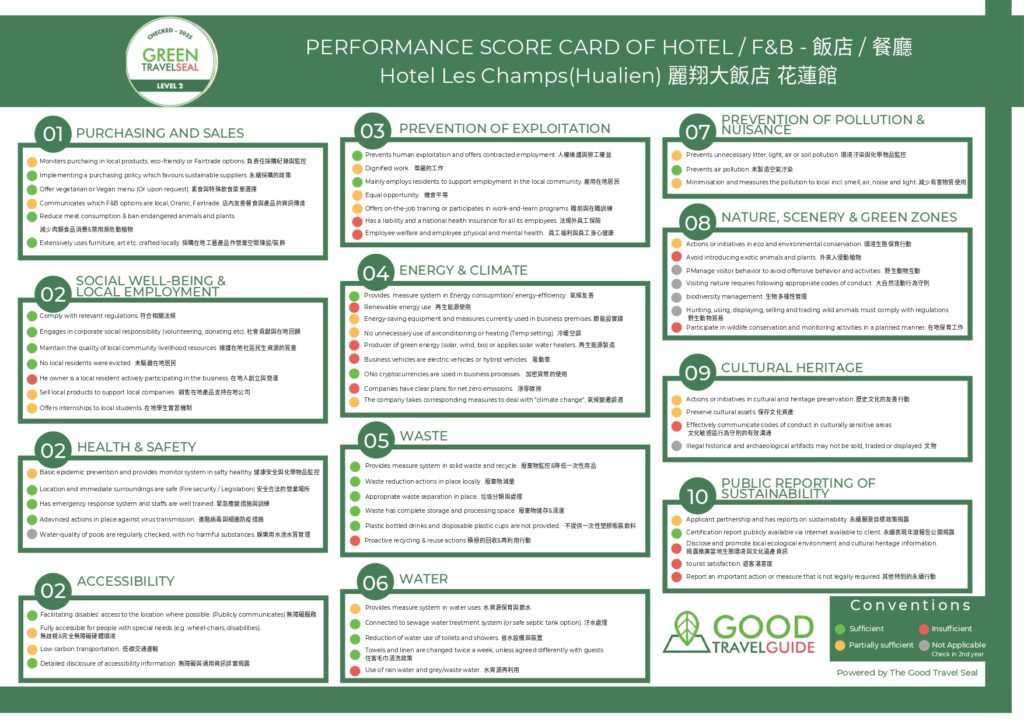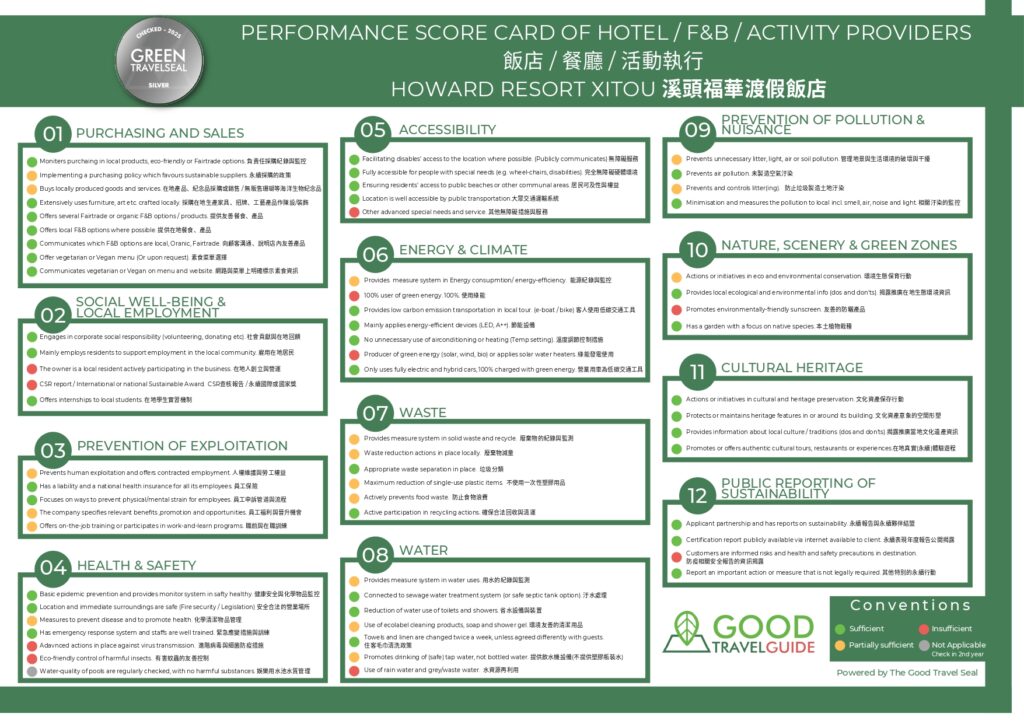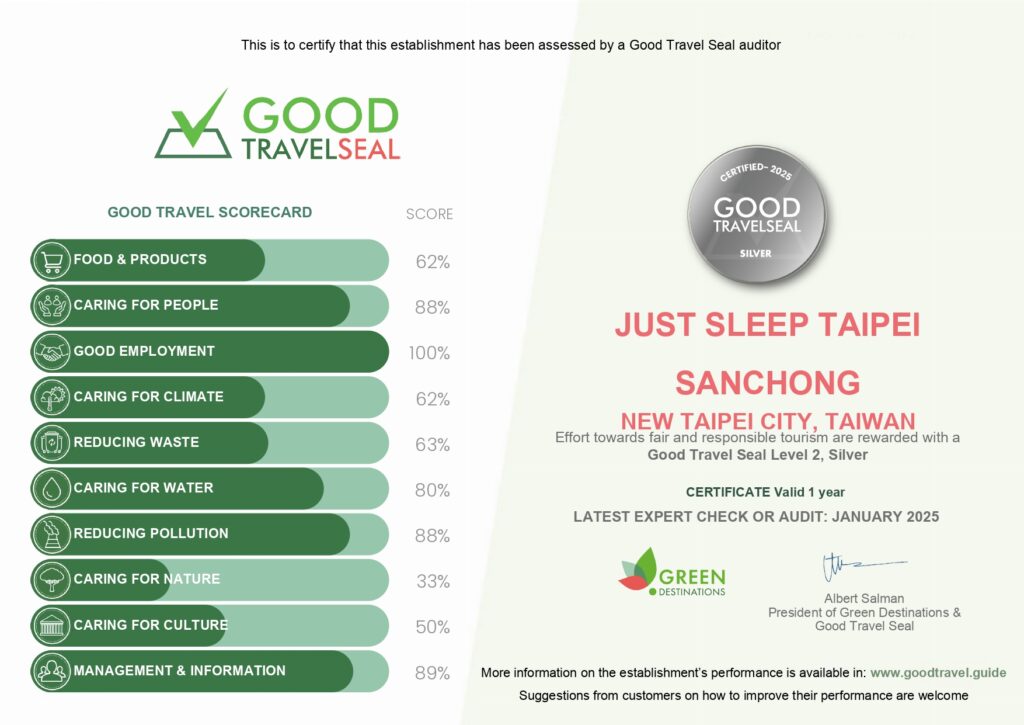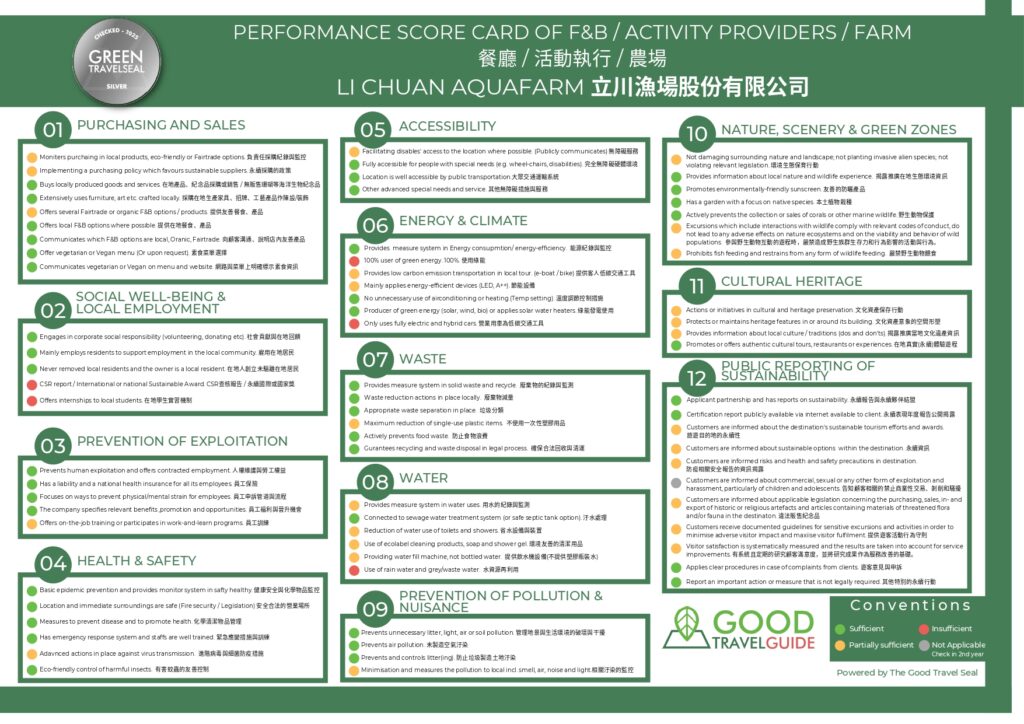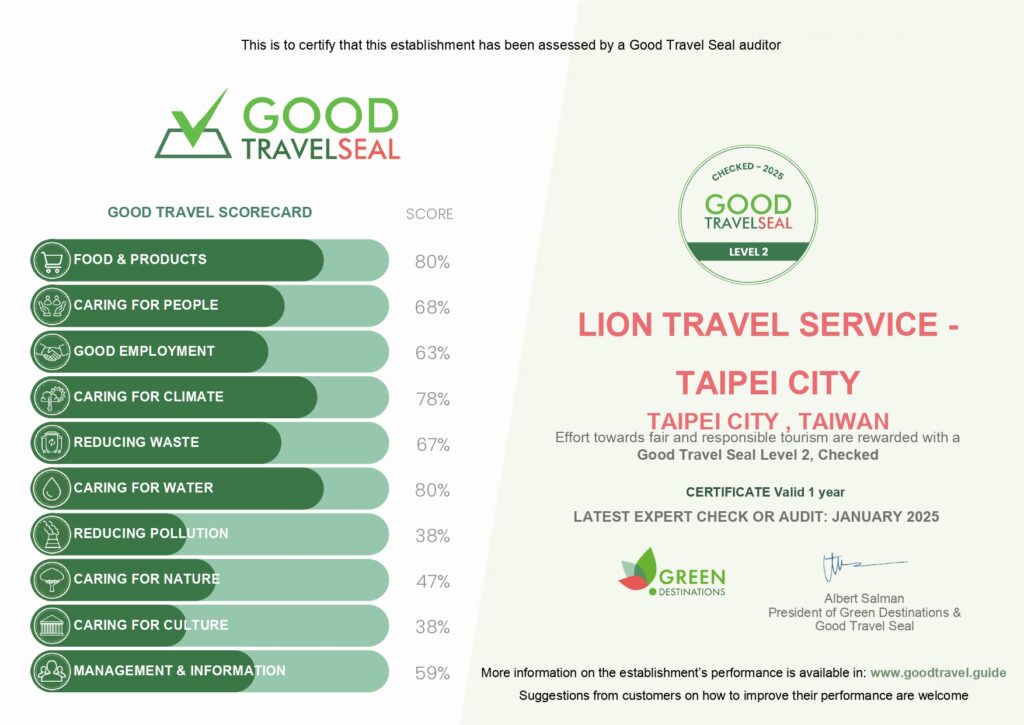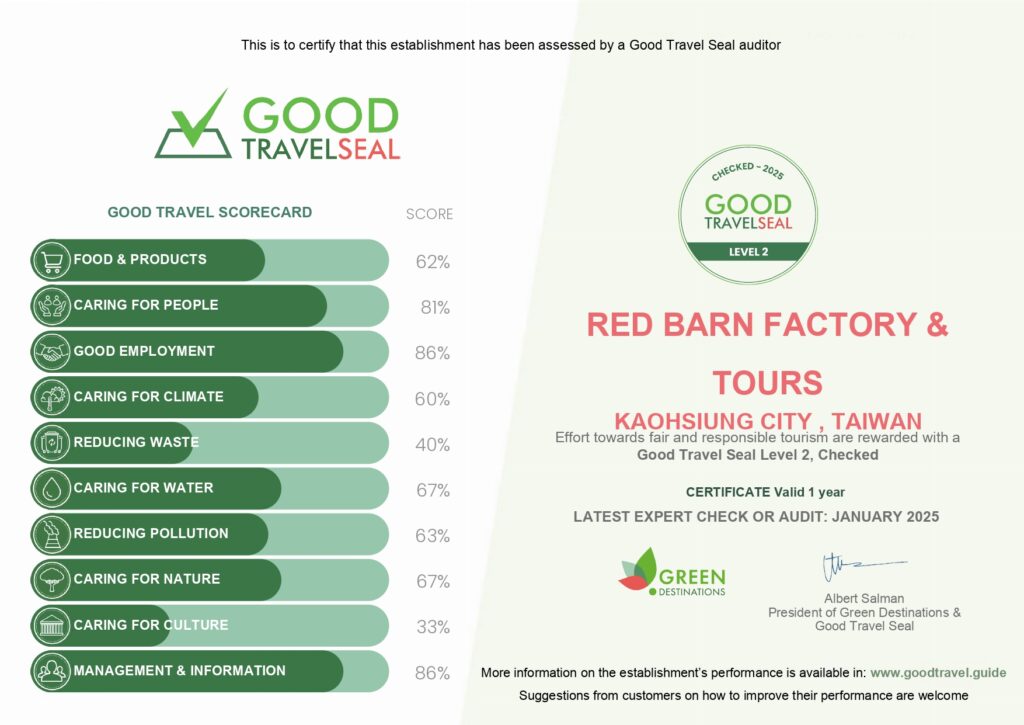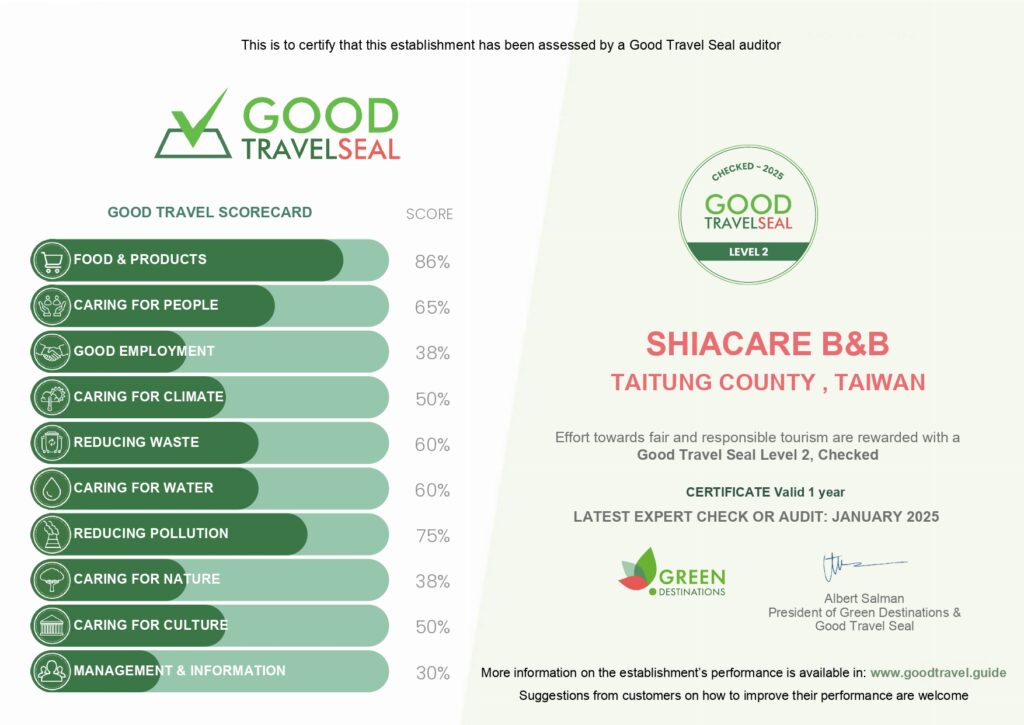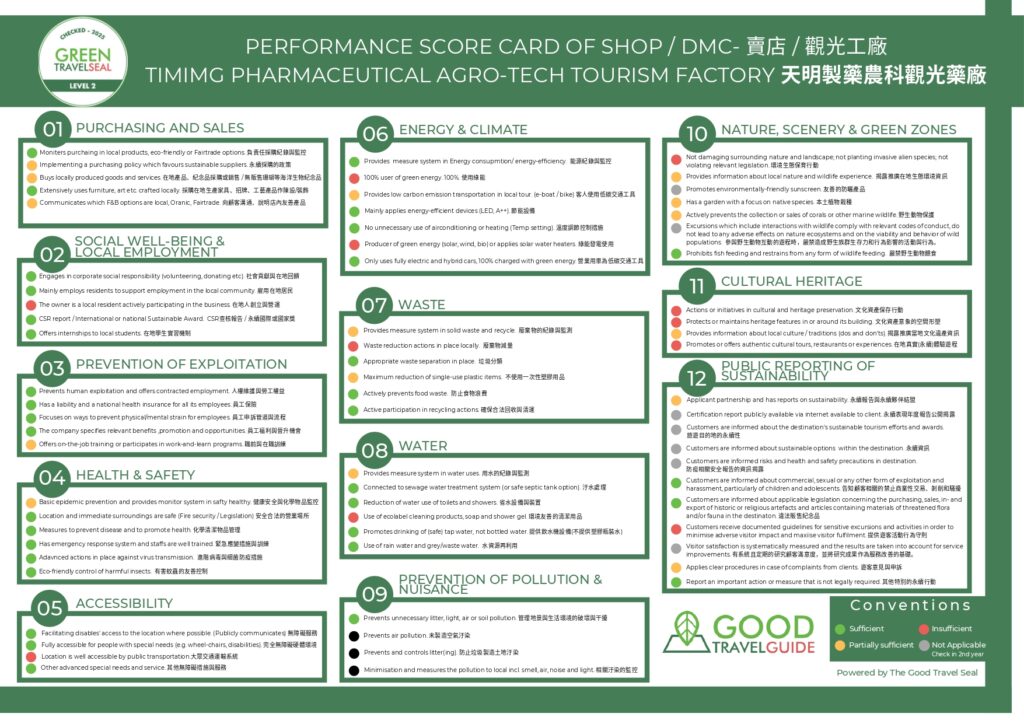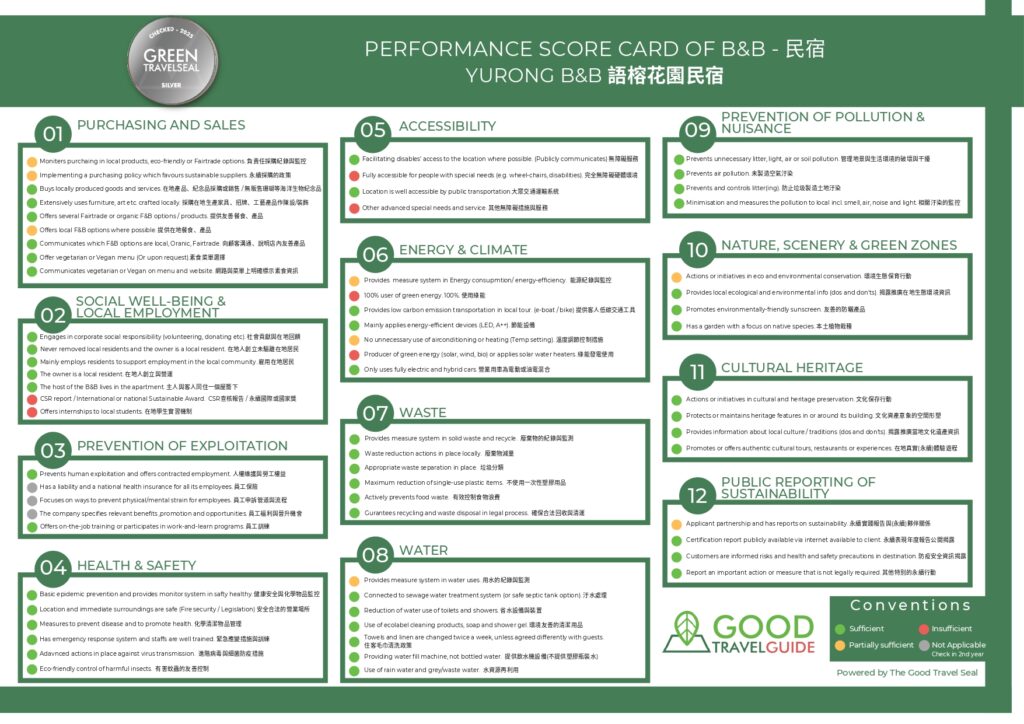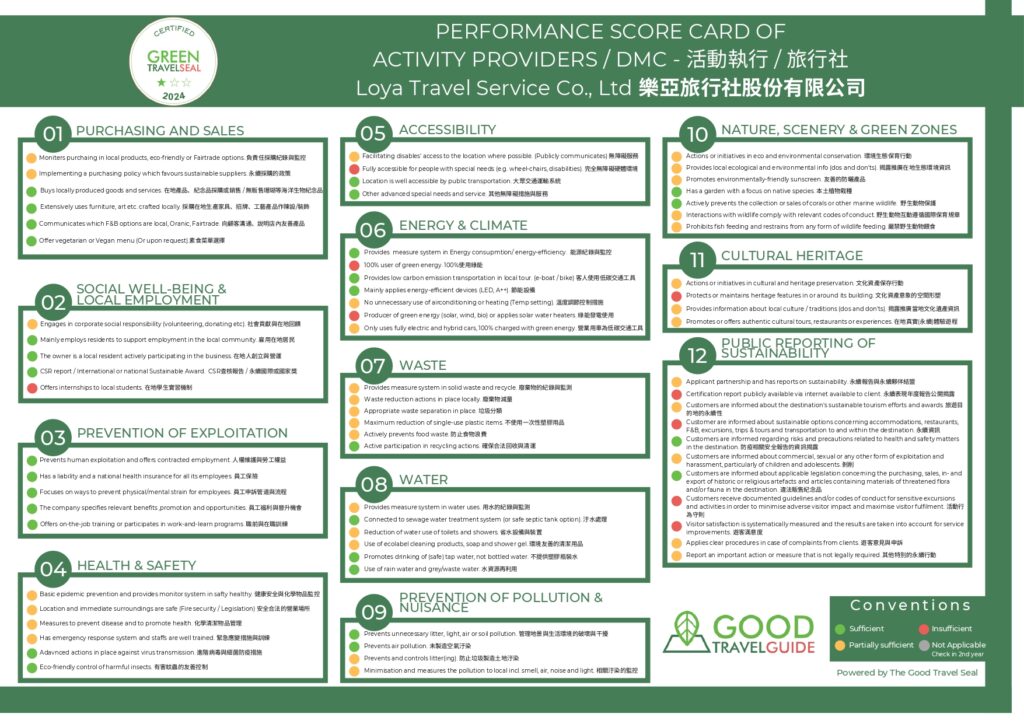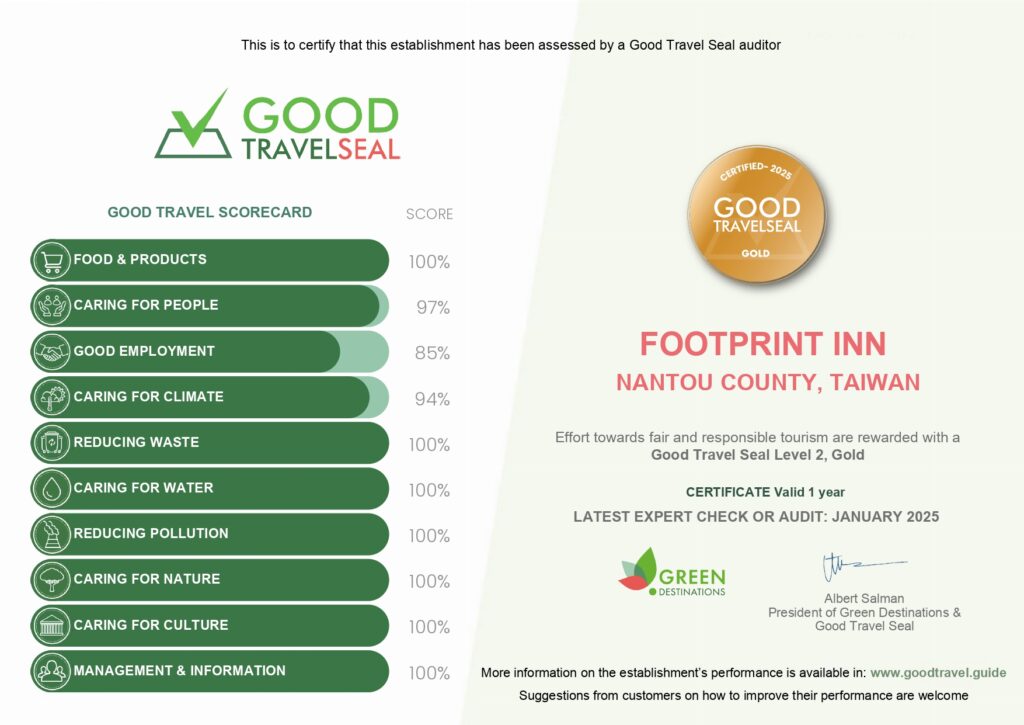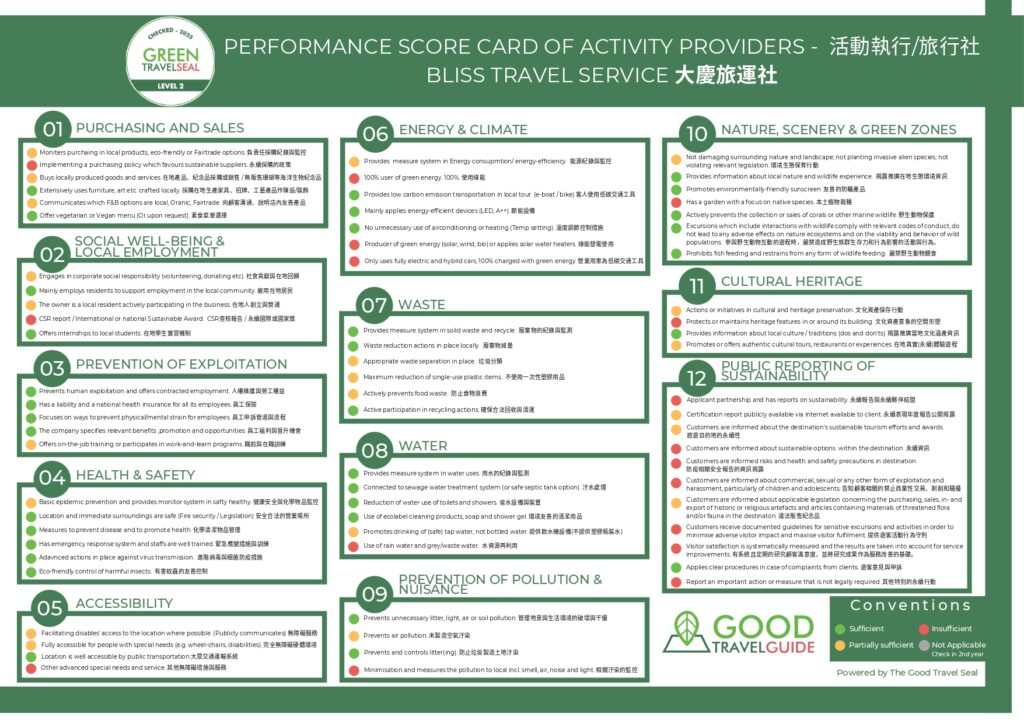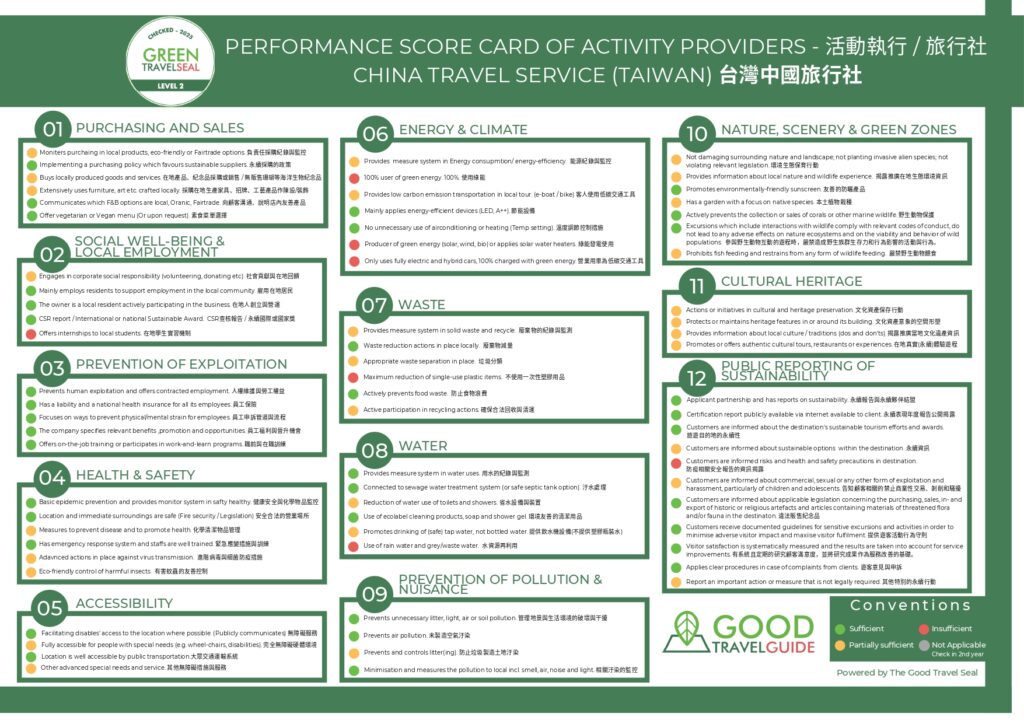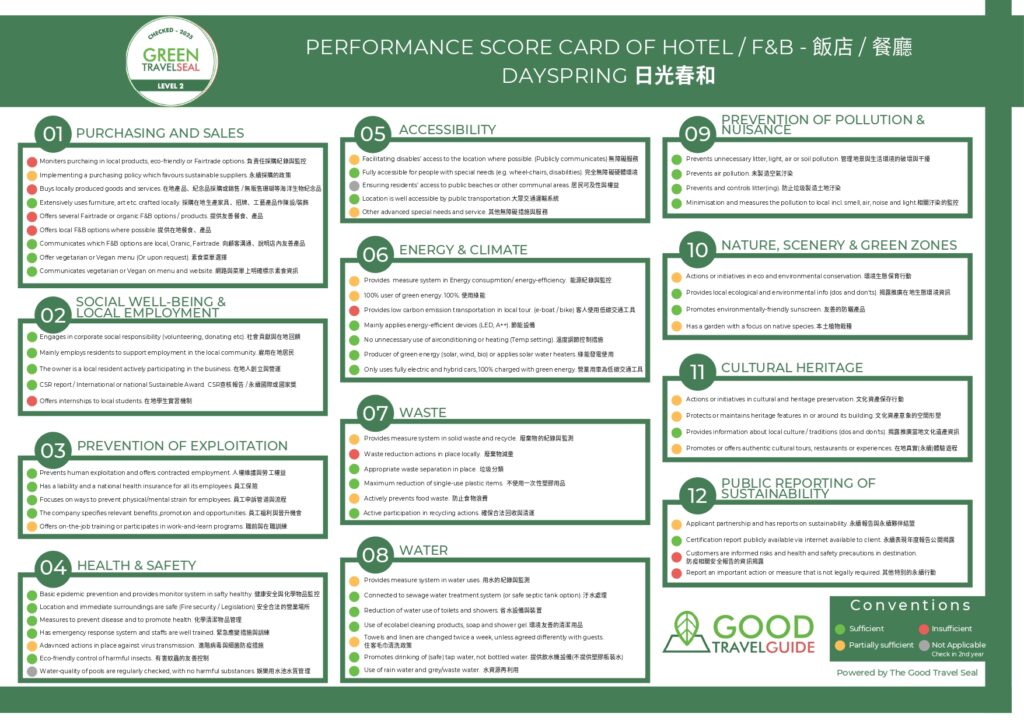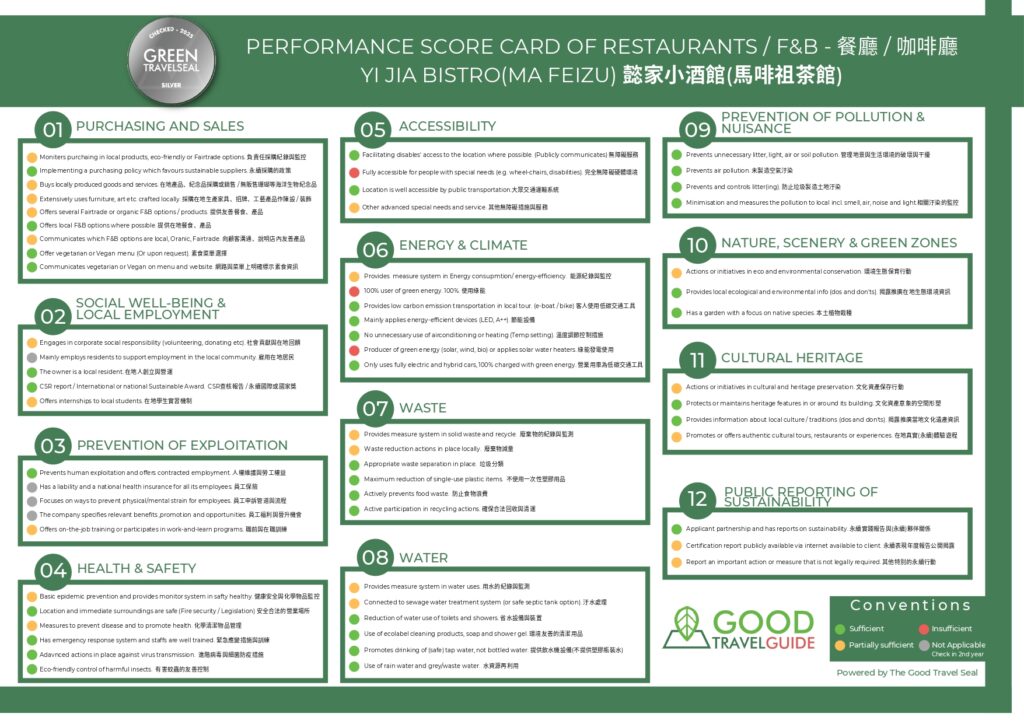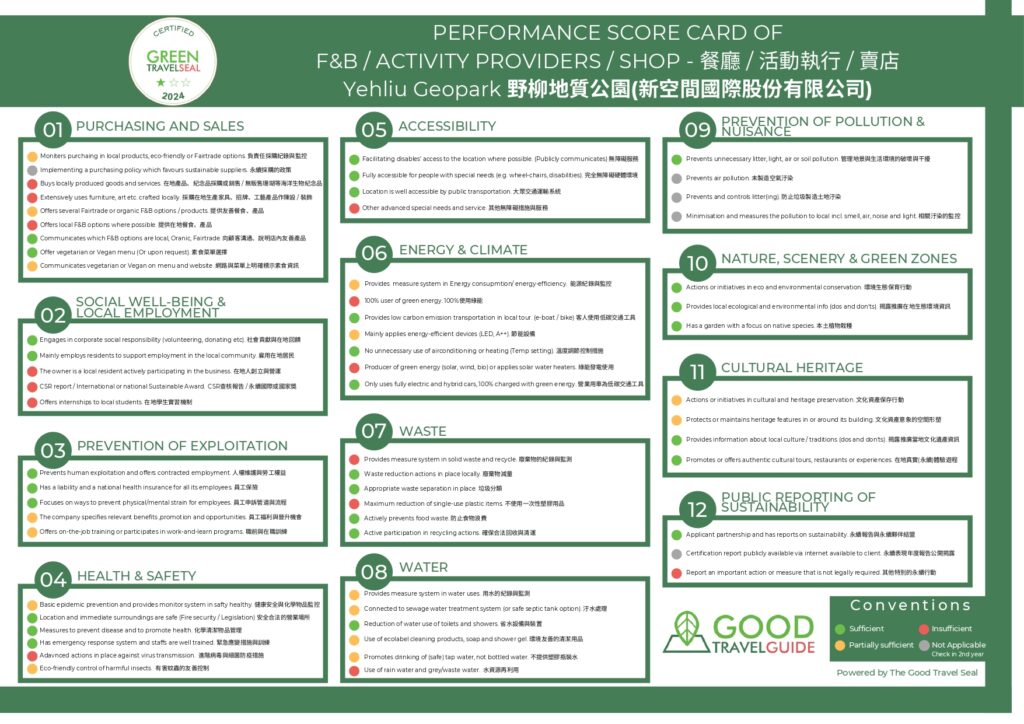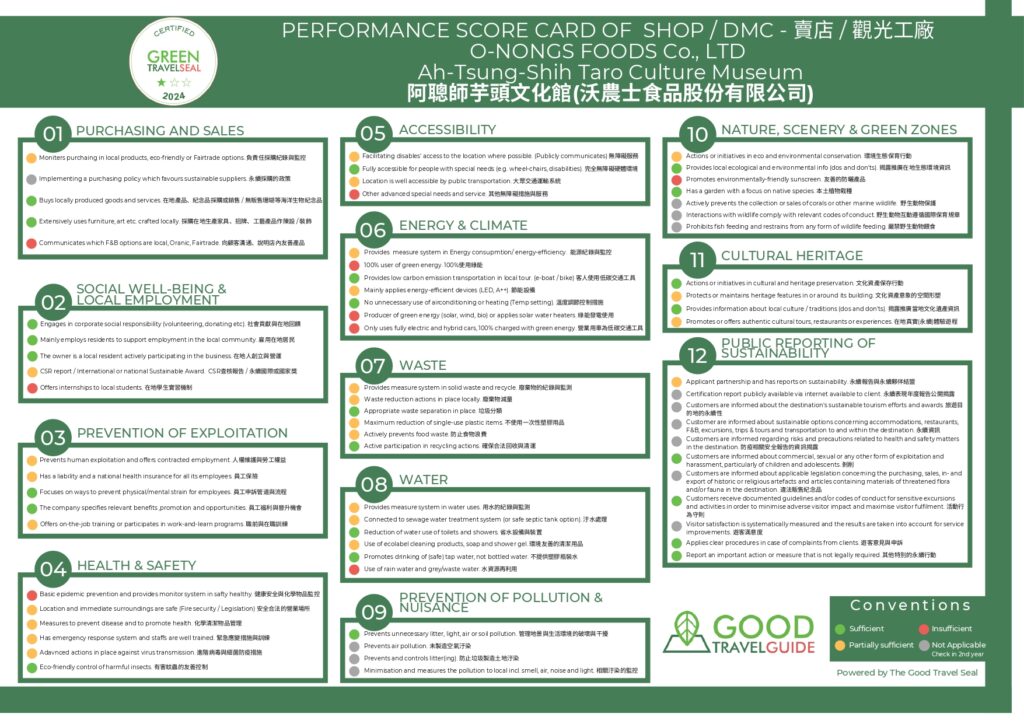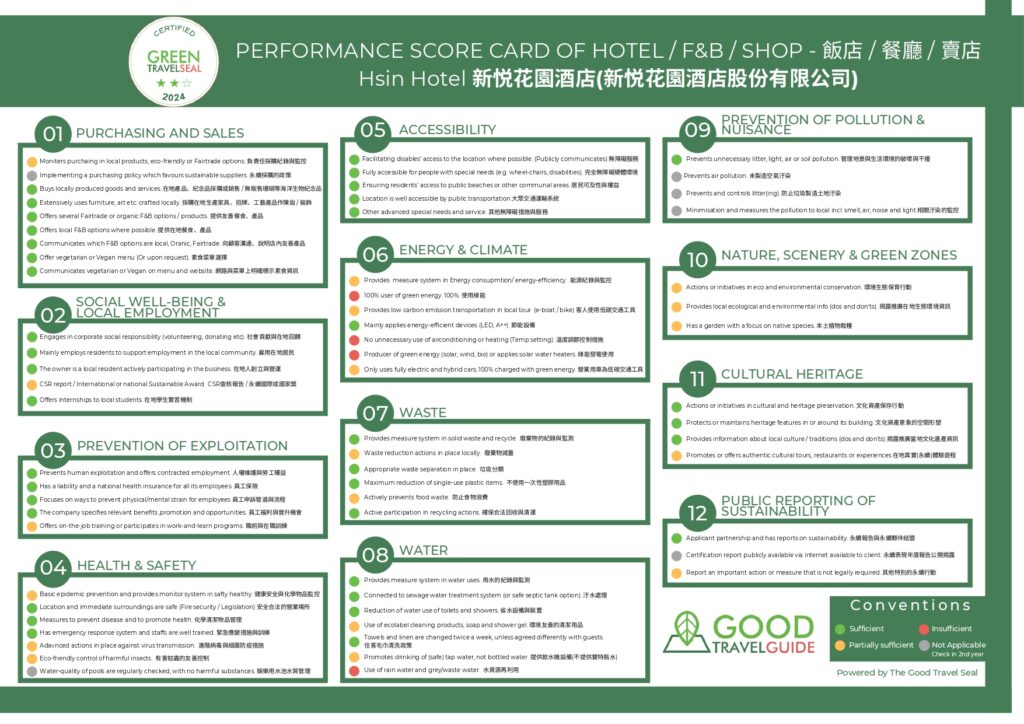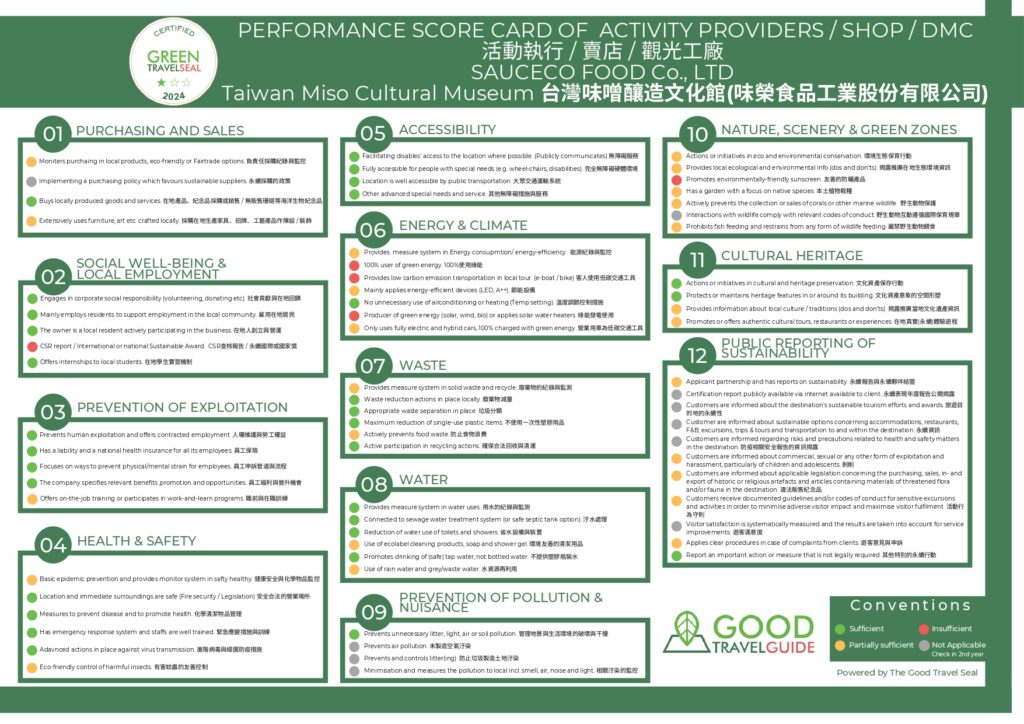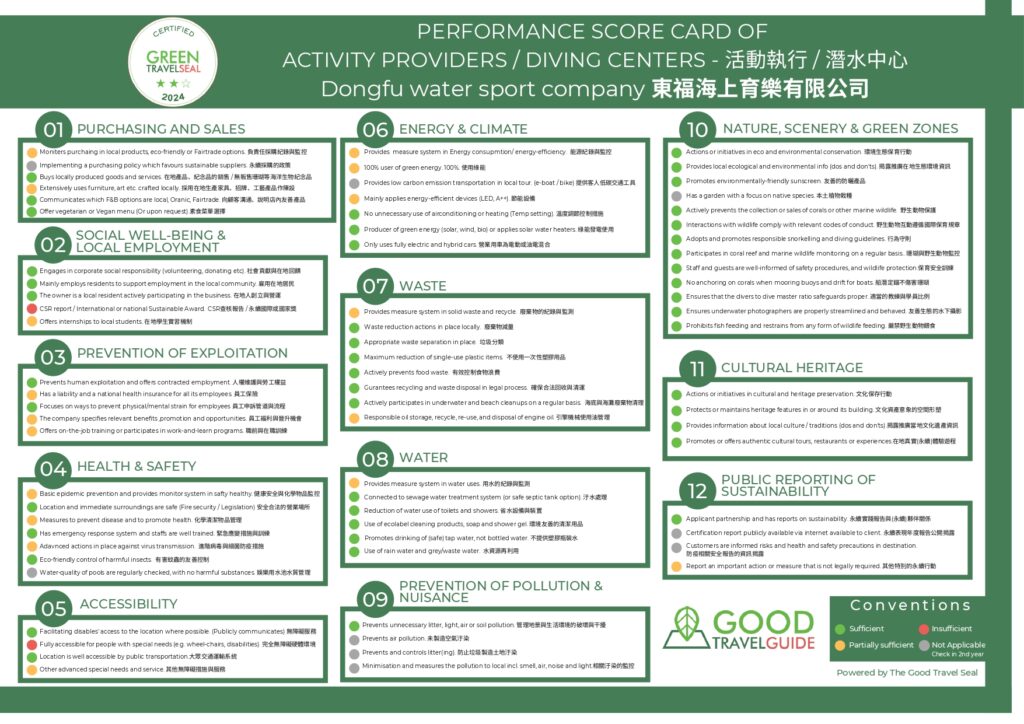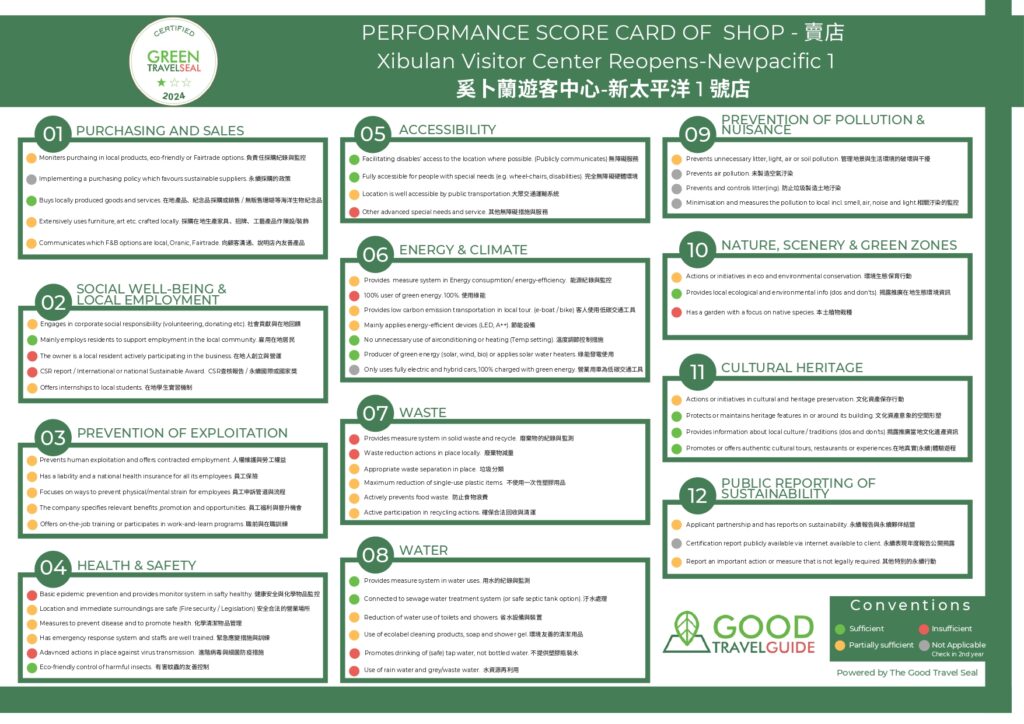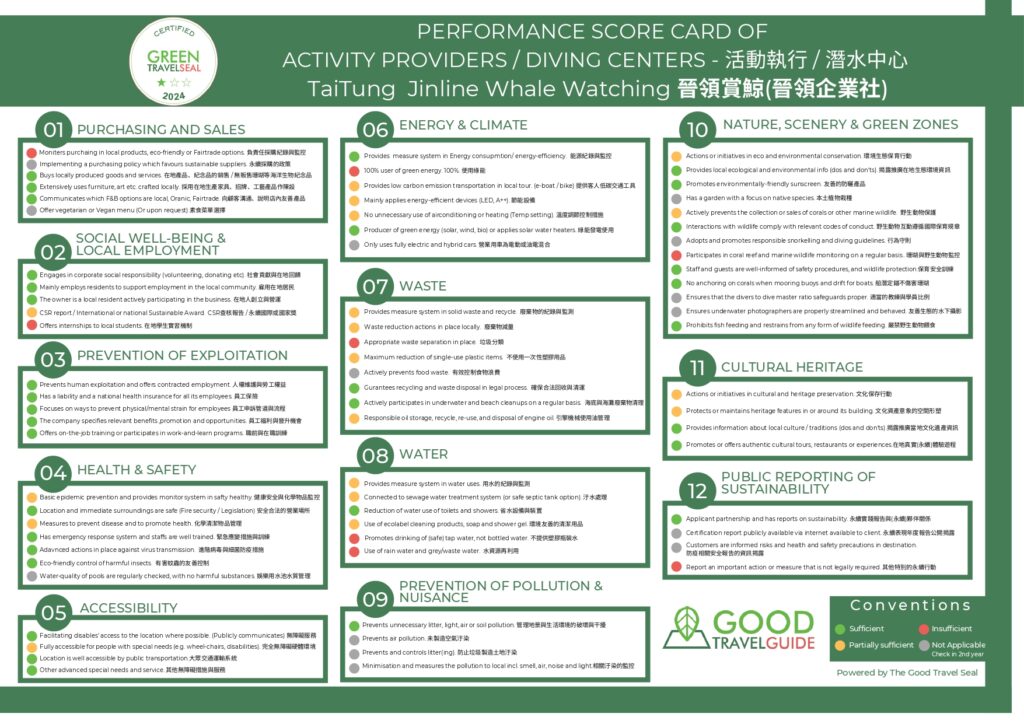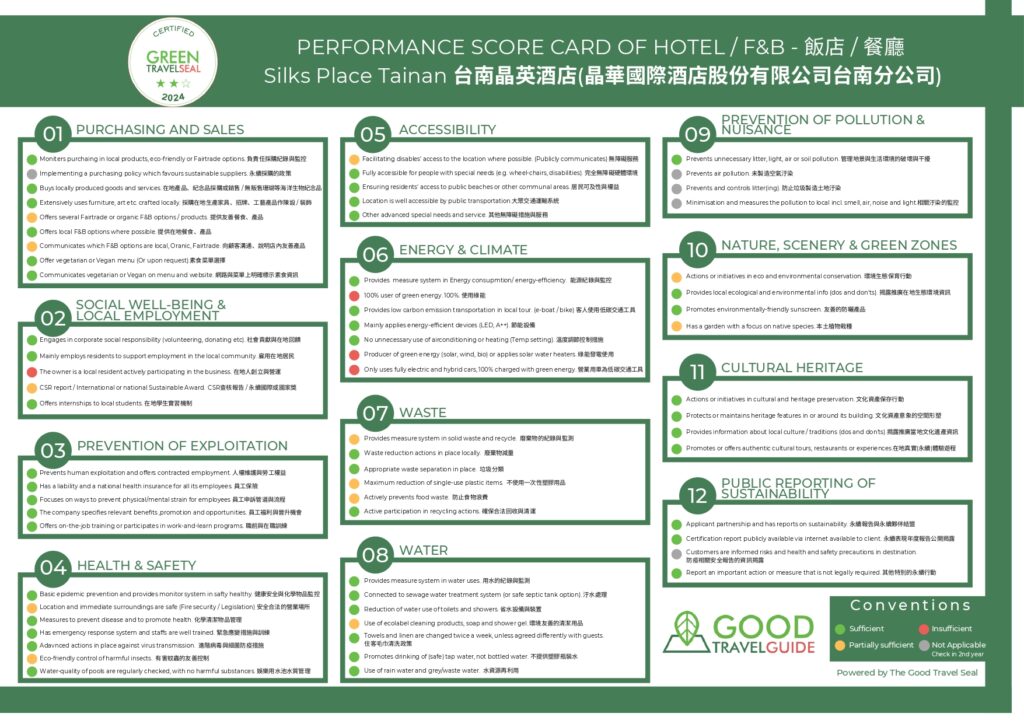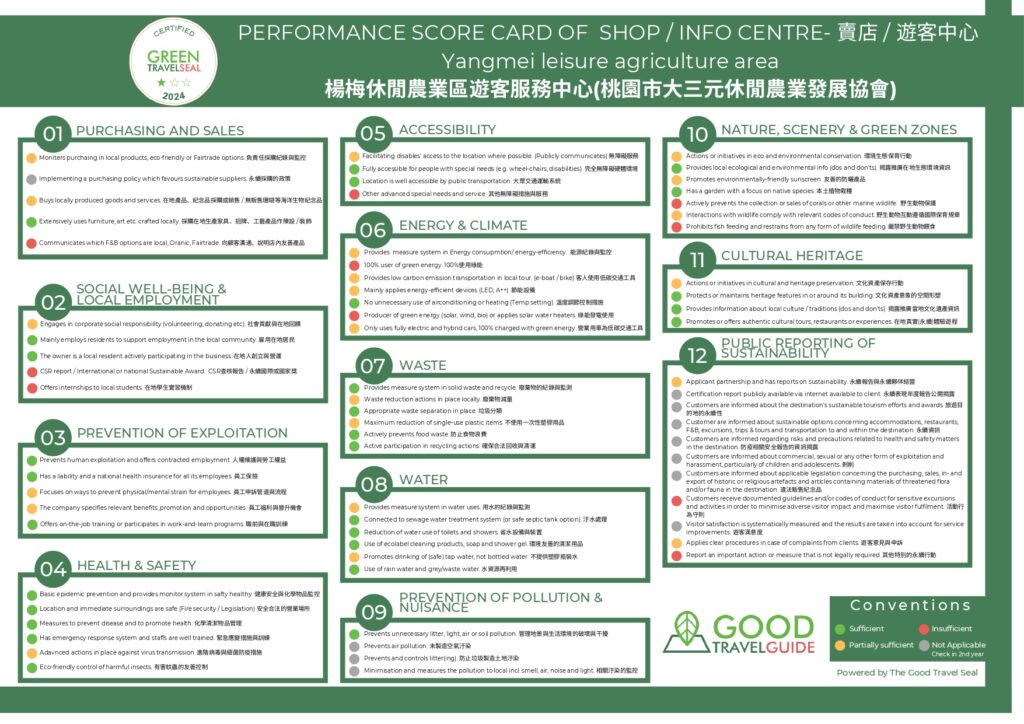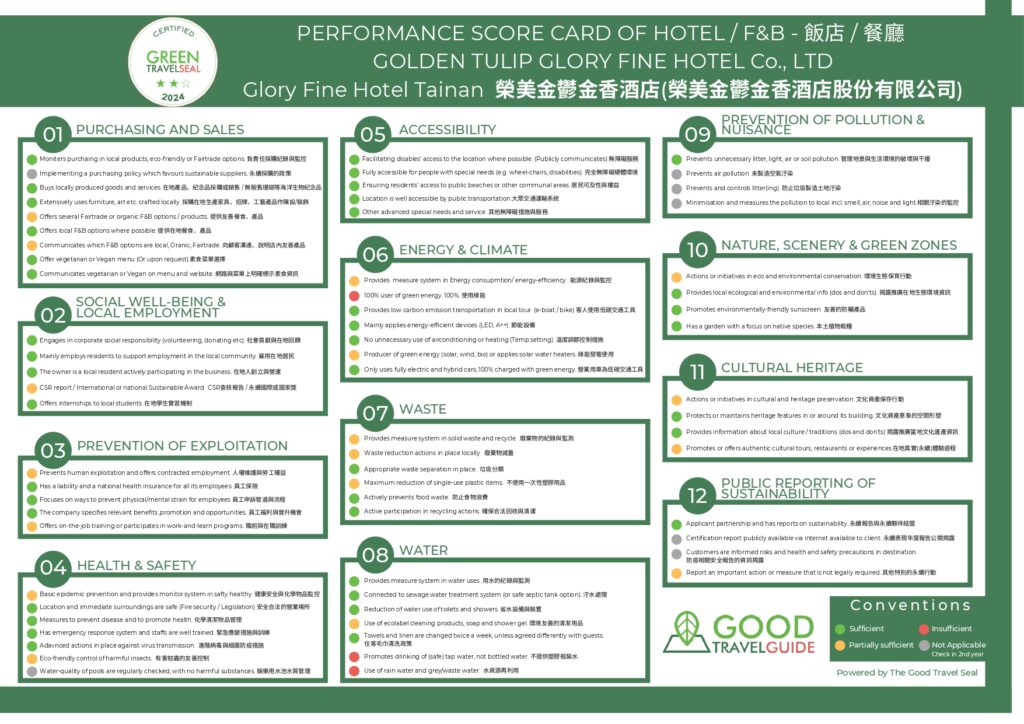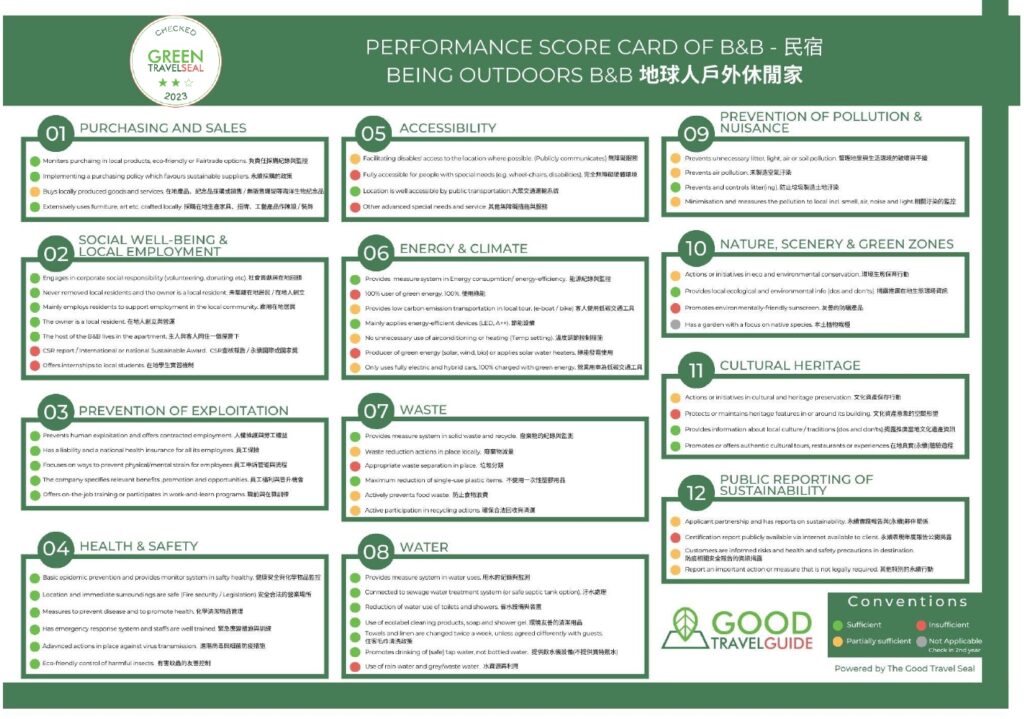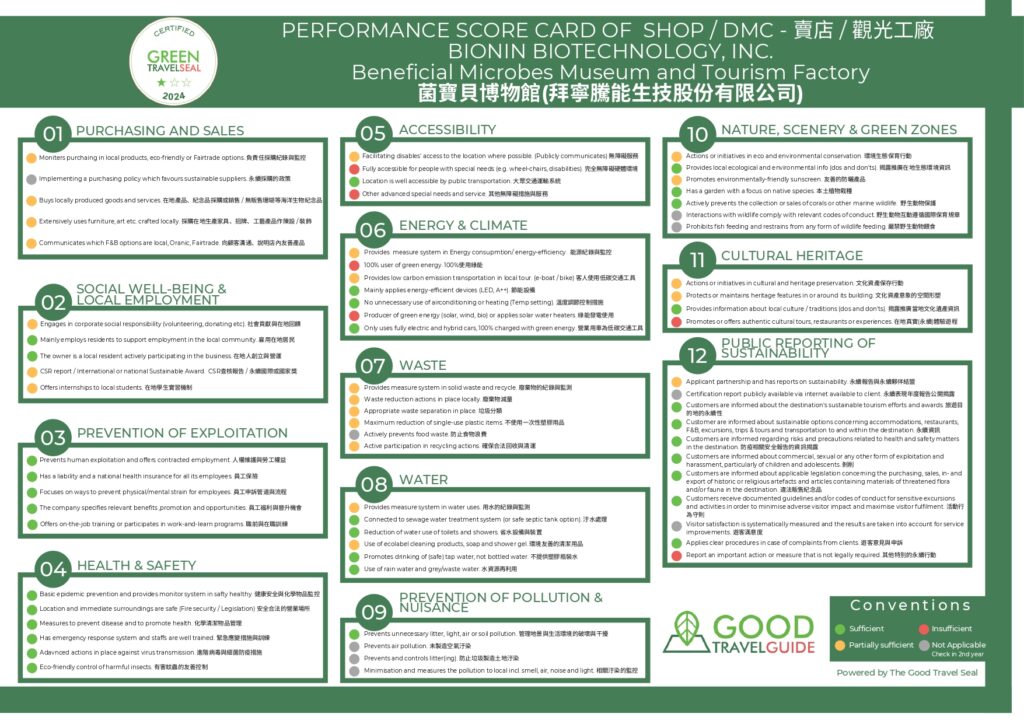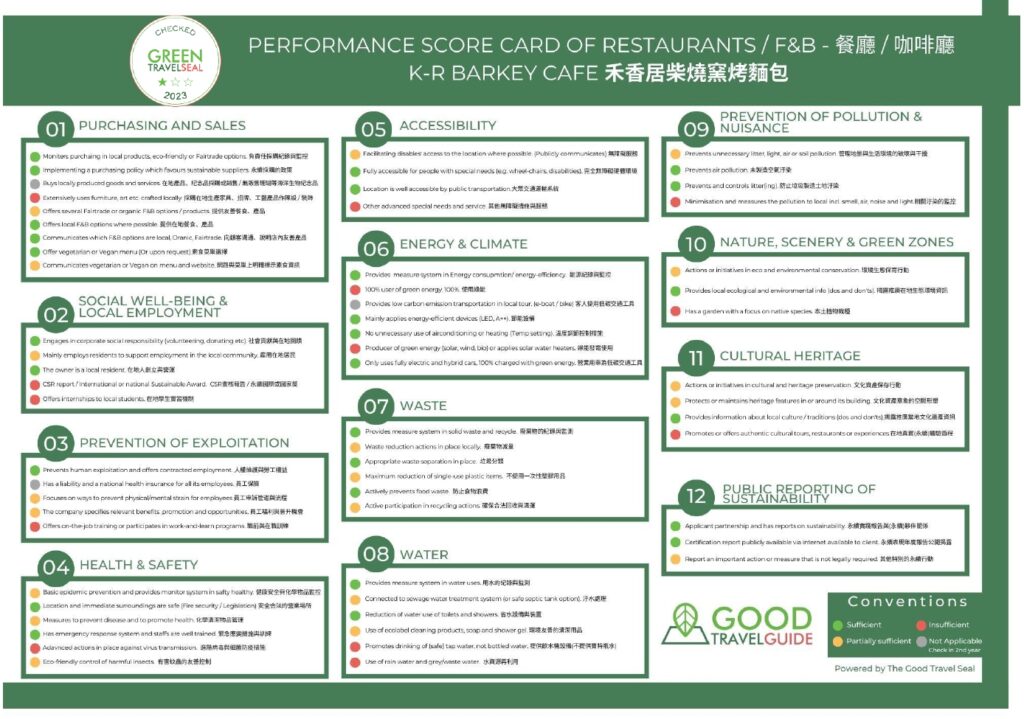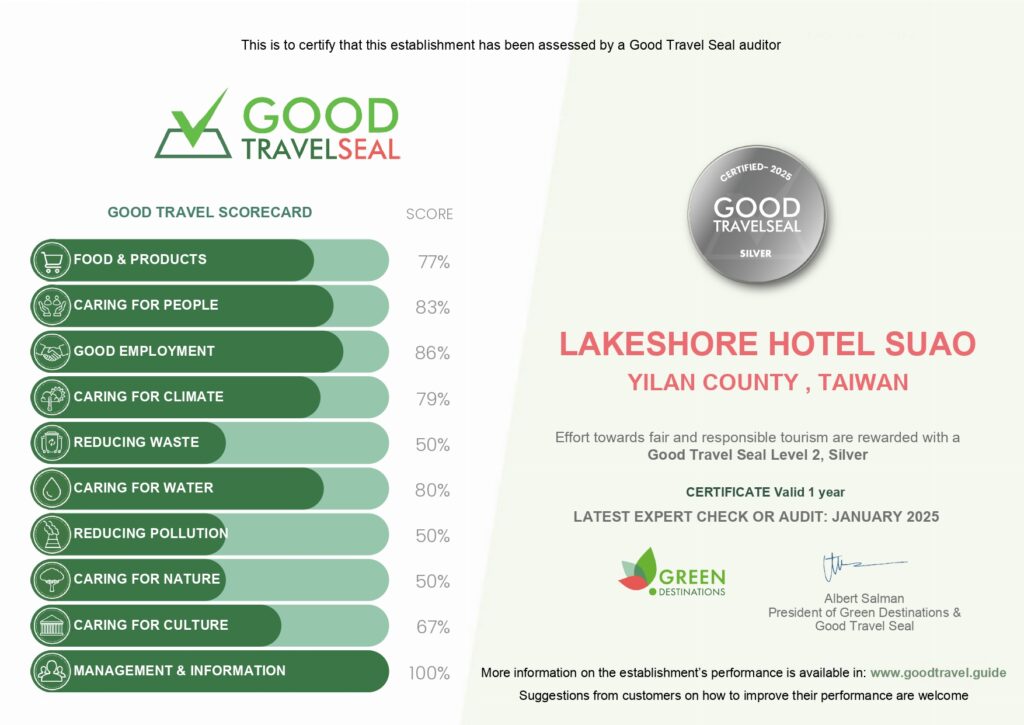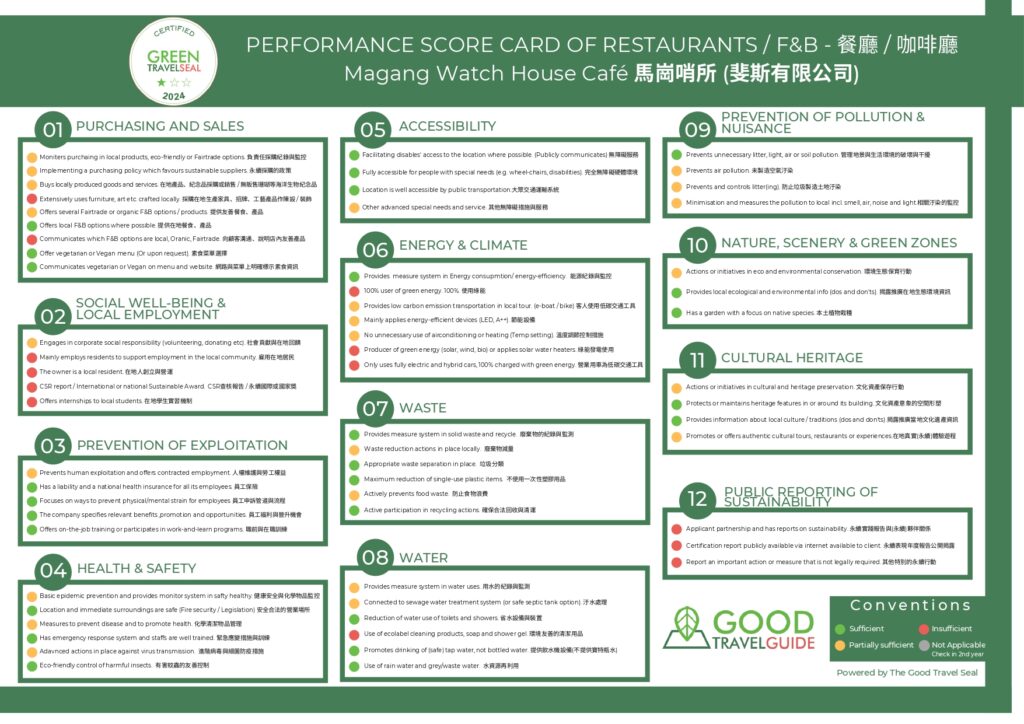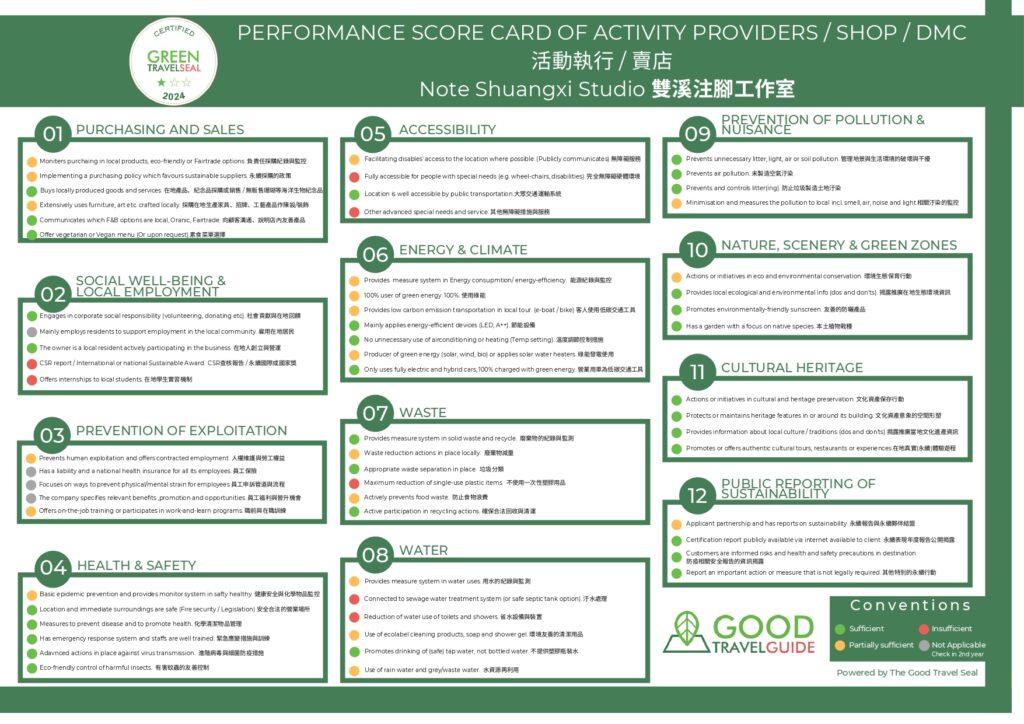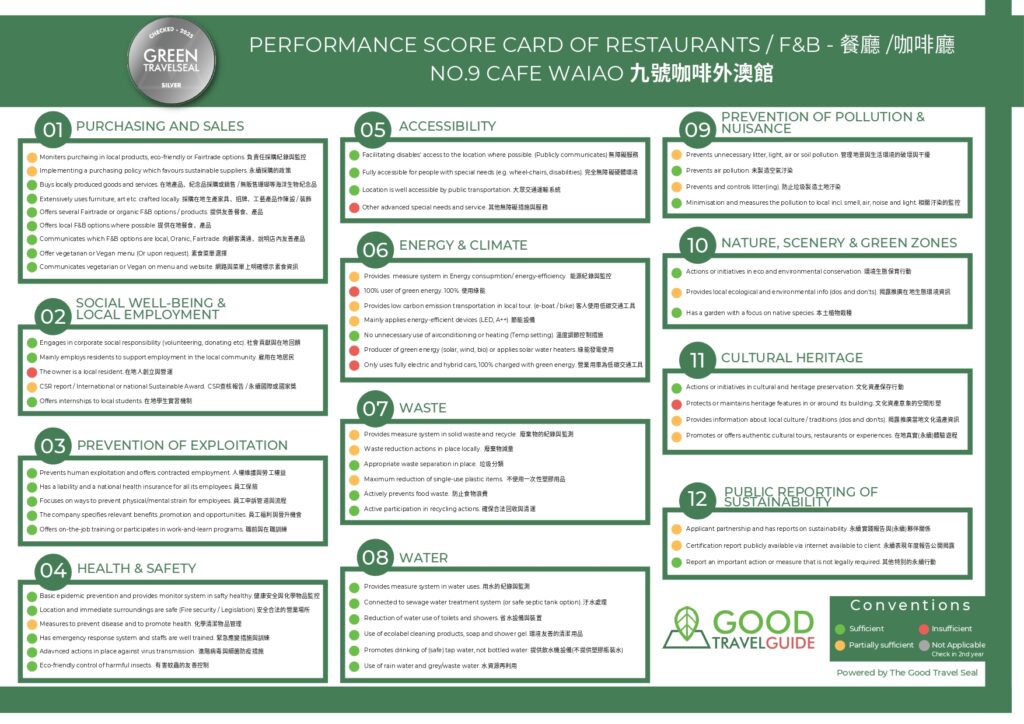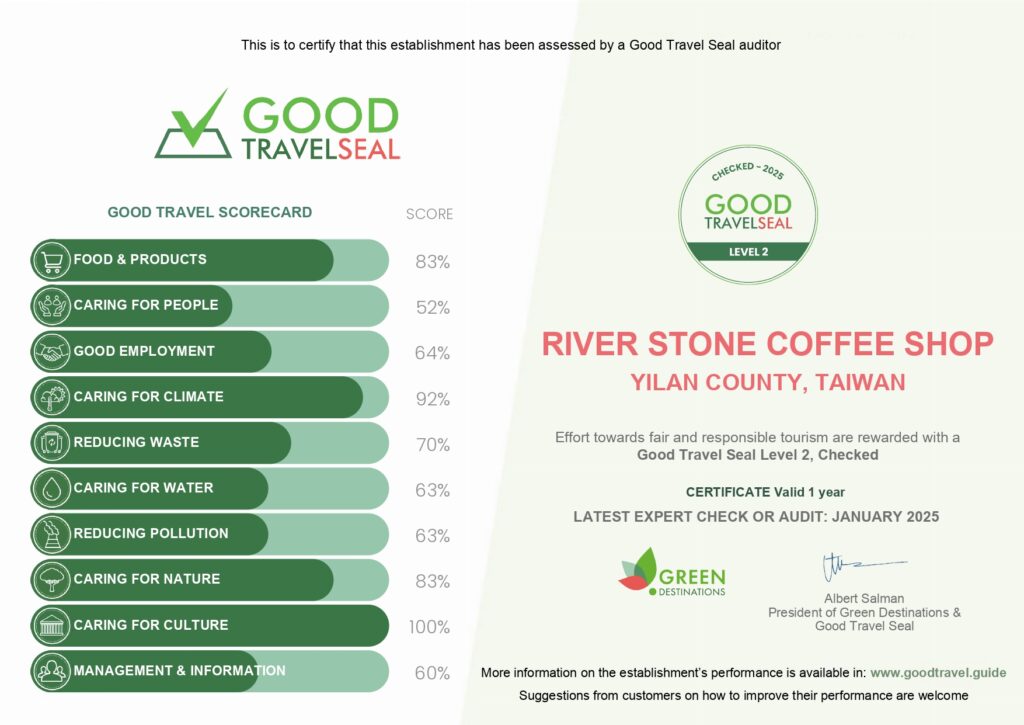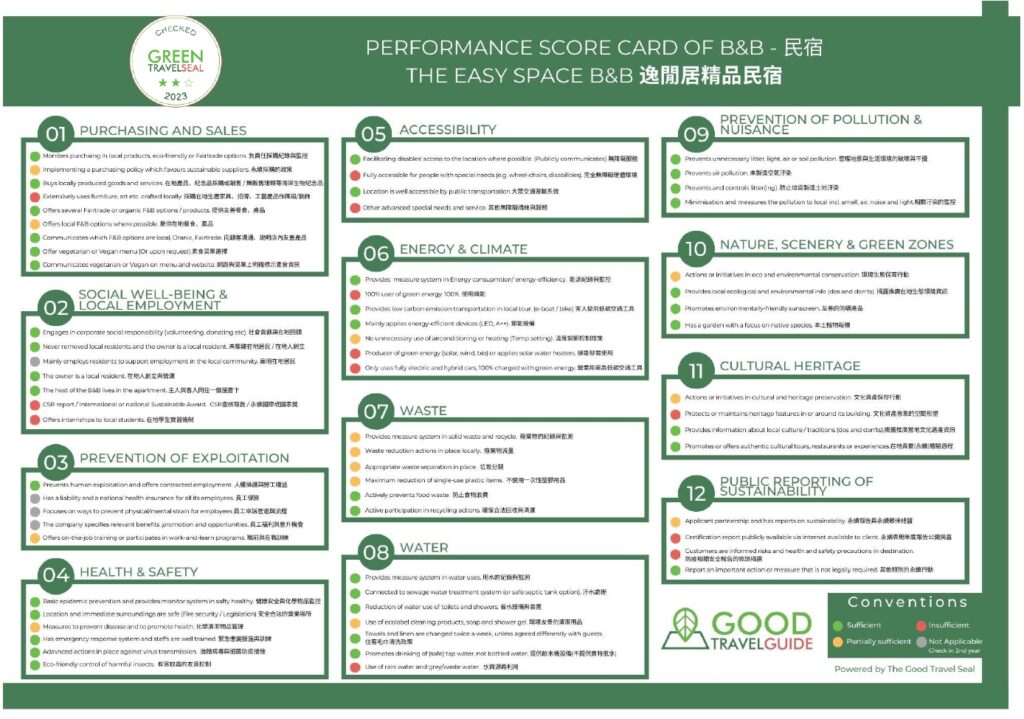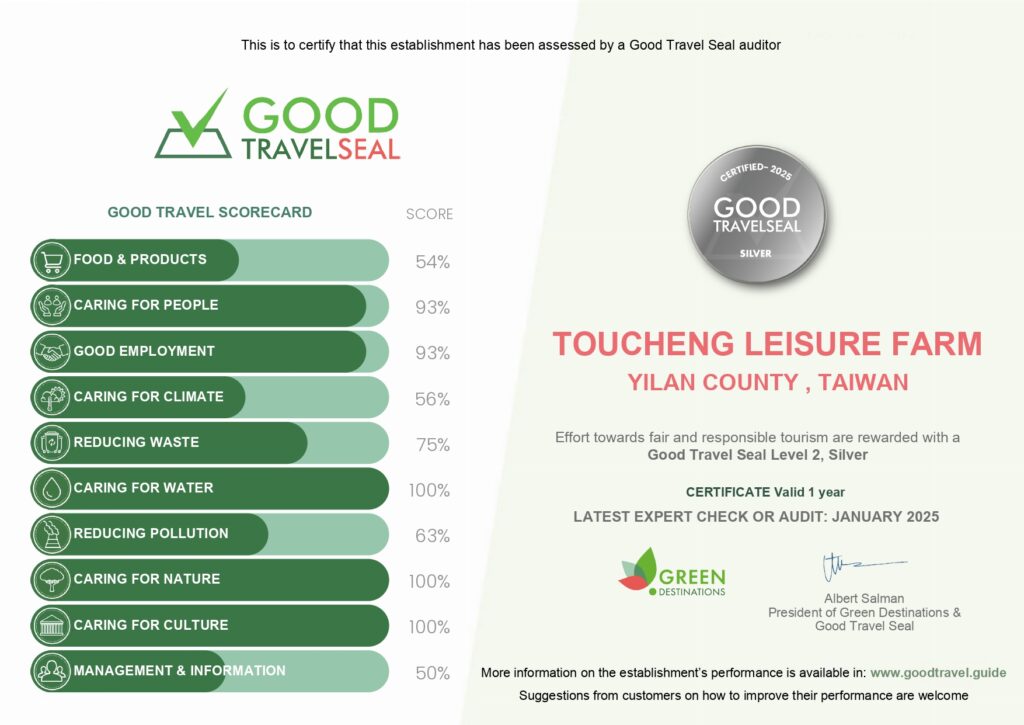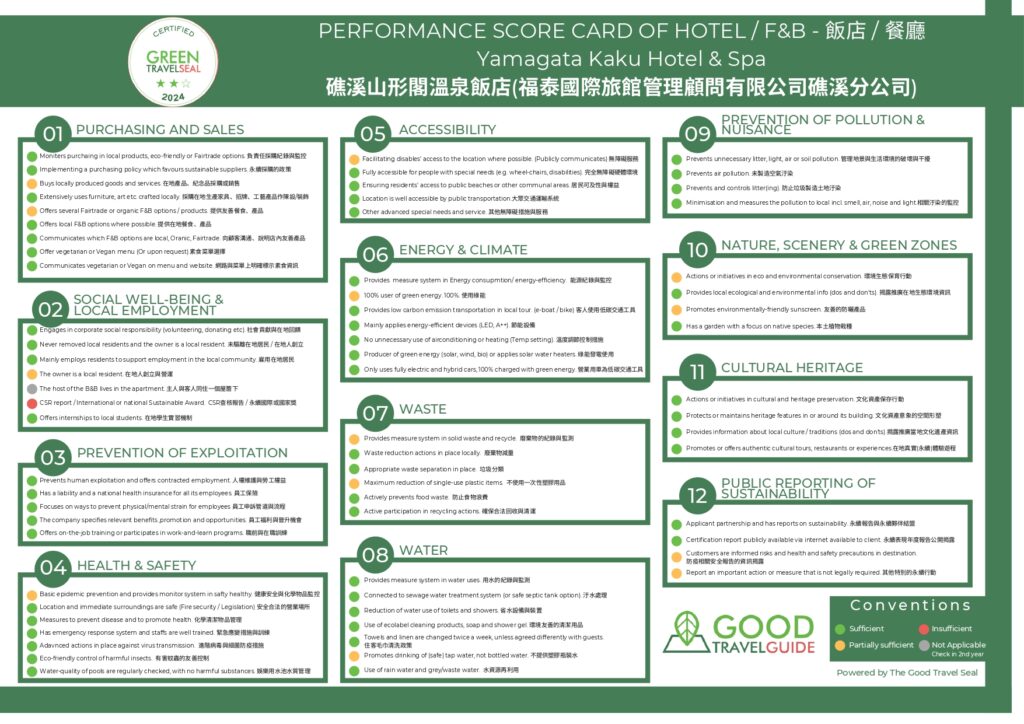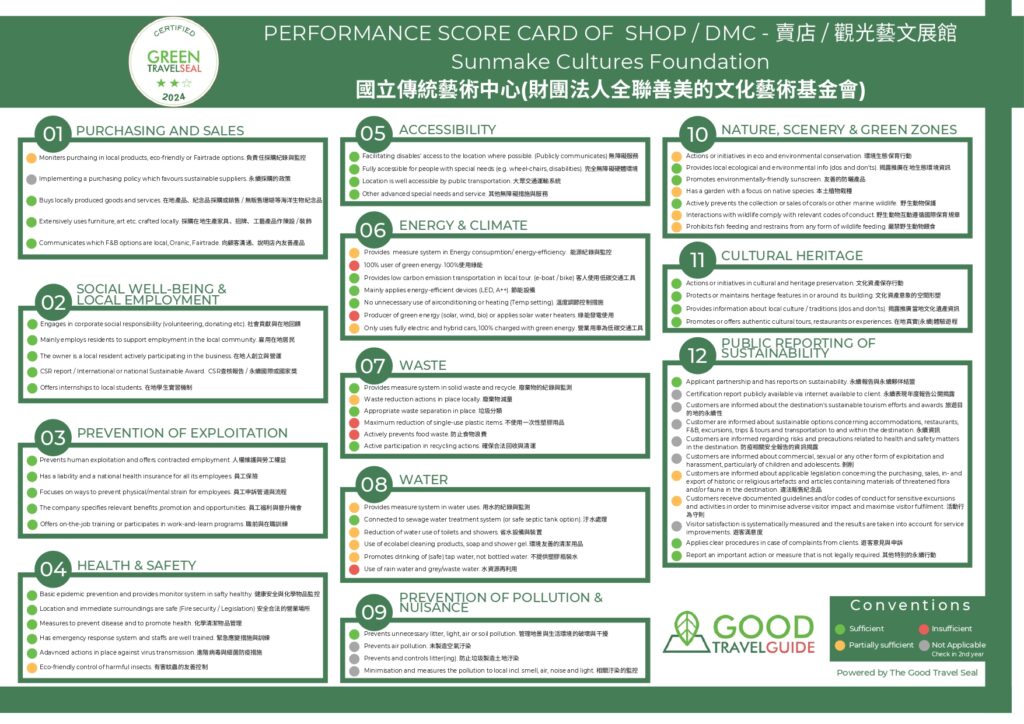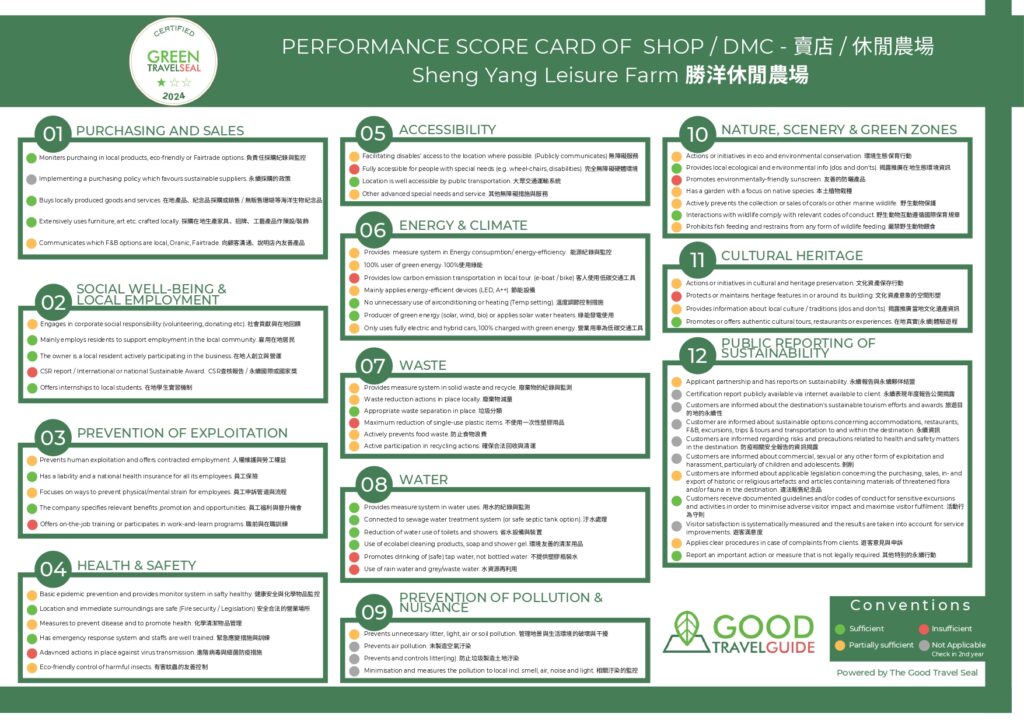Taiwan
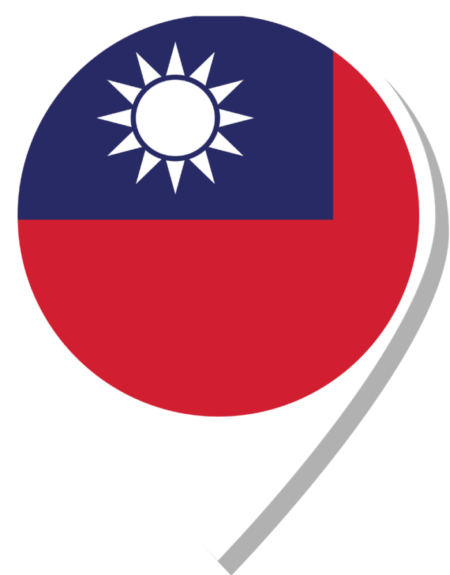
Landscapes, nature and traditions in one incredible journey
TAIWAN ECOTRAVEL is the perfect place if you are attracted by landscapes, nature, and traditions. The NORTH EAST COAST, the Taroko National Park, Jade mountain, SUN MOON LAKE and urban hot spots on the west coast you can find your happy place.
Far away from over-tourism, a Taiwan ecotravel will be a true CULTURAL EXPERIENCE. Visit TAIWAN in spring or autumn to enjoy perfect weather!
Not sure where to go?
Explore the options for a responsible trip
GOOD PLACES TO VISIT
Discover impact-driven destinations that were recognised by their efforts
GOOD TRAVEL BUSINESSES
Discover accommodations, restaurants, shops and activities that are committed to sustainability. Their efforts are summarised in a SCORECARD (click on the picture). For the Good Travel Seal, the higher the number of stars or the level (level 3 is the highest), the more aspects of sustainability are checked by an independent auditor.
- Accommodations
- Restaurants
- Activities
- Others
Aimen Beach Recreation Service Facilities
Good Travel Seal Level 2
The Aimen Beach is composed of coral and shell fragments, microorganisms, etc., with star-shaped foraminifera being the most stunning for visitors. This beautiful beach, with its fine sand, is actually connected to Lin Tou Beach. Due to the same breathtaking scenery of sea and sky, it has become the best recreational spot for local residents in Penghu.
Cycling Culture Museum
Good Travel Seal Level 2
The Cycling Culture Museum, created by Giant Group, is the first museum to explore the world of bicycles through interactive technology and the aesthetics of workmanship. The museum houses a collection of antique bicycles, installation art, movies and more. The various items show visitors the different kinds of bicycles and their history. We hope that this interaction with our collection will help people to see bicycles in a different light.
Dagedan House B&B
Good Travel Seal Level 2
“Dagedanhouse B&B” is located in an indigenous village by the coast, aiming to offer travelers a truly relaxing holiday. Rooms do not have televisions and provide local music and books, encouraging visitors to focus more on themselves and the surrounding environment. Before check-in, guests can take a basket of local snacks to the beach for a picnic. After checking in, they can participate in beach clean-ups or enjoy hand-brewed coffee sourced from Taitung, experiencing a lifestyle different from their daily routine, and truly feeling relaxed and rested during their vacation.
Promo code: GTG10DISC
Discovery Hotel
Good Travel Seal Level 2
The Discovery Hotel, located in the heart of Penghu County, boasts a prime location adjacent to the Magong Third Fishing Harbor, offering convenient transportation and beautiful harbor views for guests.
The hotel design blends local culture and fishing island elements, creating a unique atmosphere full of regional attributes. It features a range of public facilities, including a gym, a sky pool, a basketball court, and a sauna, providing guests with comprehensive leisure options for a wonderful stay.
The Discovery Hotel also offers five types of room options, each with spacious space and a balcony, providing an ultimate relaxation experience. The harbor-view rooms have spectacular scenes, inviting you to come and experience the breathtaking scenery.
Ecotour Taiwan Travel Service Co., Ltd
Good Travel Seal Level 2
Ecotour Taiwan Travel Service is committed to the core values of “sustainability, ecology, low-carbon, and wellness,” believing that responsible tourism allows more people to experience the beauty of Taiwan. We offer diverse travel themes, including forests, indigenous cultures, small towns, historic trails, mountain ranges, and agricultural education. By curating meaningful journeys, we aim to bring people closer to the land, fostering a deeper connection with Taiwan’s natural and cultural heritage.
Golden Foundation Tours Corp.
Good Travel Seal Level 2
Over 50-year Experienced Inbound Operator. Great Knowledge of Destination and Mentality to Meet Clients’ Expectation.
Offer Quality Services with Fun & Laughter and Professionalism. Offer Customized Special Interest Tours, Incentive and Conference, Hiking, Trekking, Cycling etc.
Shore Excursions Agent Appointed by International Cruise Liners Signature Tours on SIC Services.
The Contribution for Taiwan Tourism Promotion Awarded by TBROC.
GOOD PRACTICE STORIES

Get inspired with stories from places and people that are acting for a fair and responsible tourism
East Coast National Scenic Area
The Fugang Community, where Xiaoyeliu Recreation Area is located, faces major issues such as population outflow, aging, and environmental impacts caused by transient tourists. Therefore, we collaborated with the Fugang Community to establish the Fugang Geopark and, through destination management, achieve a balance in the region’s ecology, community economy, and culture. These strategies include ecological guided experiences (such as night visits to Xiaoyeliu and the Shell Collection Project to provide homes for hermit crabs), promoting environmental education (such as Xiaoyeliu Nature Classroom), and community revitalization and marketing (such as the Fugang Harbor Regional Tourism Circle Plan). The traditional fishing-based economy has gradually declined, and as a transit port for trips to Orchid Island and Green Island, Fugang has struggled to attract tourists to stay and has failed to highlight its local characteristics. To address these issues, the establishment of the Fugang Geopark is crucial.
Footprint Inn
As not many travelers grasp the true meaning of sustainability, Footprint Inn was built with the aim to create a bond between people and the planet. The facility encourages guests to prioritize earth friendly experiences over personal preferences, with the hope to inspire more conscious travel.
North Coast & Guanyinshan
The ocean of North Coast and Guanyinshan National Scenic Area (NSA) currents have caused significant marine debris accumulation on reefs and beaches. This debris threatens the area’s biological and economic productivity, making the cleanup of coastal waste a critical environmental issue for the sustainability of the North Coast’s ecosystem and its associated human activities. Through beach cleaning mechanisms, it has been possible to create value for recycled marine waste materials and shape an industrial chain for marine waste recycling. The aims are to create a zero-waste tourism environment and disseminate the the importance of small daily actions for the local community. Thanks to these initiatives, it has been possible promoting the Satoumi initiative: a balanced relationship between humans, sea and costal ecosystem.
North East and Yilan Coast
The Zhuangwei Dune Ecological Park aims to boost regional tourism. To balance tourism development with the natural environment, NEYC initiated the “Zhuangwei Dune Ecological Park Construction and Development Project” in 2008. The park’s construction would cause negative impact on the local landscape and ecological environment. Therefor NEYC has formulated and implemented natural and landscape planning principles. These include reducing the volume of significant buildings within the park, establishing regular maintenance and review protocols for park landscaping, and flexibly using outdoor spaces for art performances. These strategies have been recognized with awards, and we have observed that the park possesses rich ecological resources.
Penghu
In the past century, large-scale fishing, coastal development, and waste pollution have drastically reduced the number of green turtles returning to Wanganisland to nest. To protect their habitat, nesting protection areas were designated, and rangers and volunteers were deployed. The first “Green Turtle Conservation Center” in Taiwan was established in Wangan, focusing on ecological conservation education and showcasing Wangan’s ecological resources. The center provides shelter for injured turtles, assists professionals in research and rescue efforts, and promotes eco-tourism and marine ecological education. Since 1995, over a hundred female turtles (not distinguishing repeated returns) have returned to Wangan to nest. This unique ecological resource attracts tourists annually, facilitating the organization of workshops and camps to promote marine ecological education and generate economic income for the local community.
Southwest Coast National Scenic Area
After salt fields were abandoned, the Southwest Coast of Taiwan became an attraction to various bird species, developing rich wetland ecosystems. However, issues like waste and uncontrolled resource extraction arose. To fight against these issues, the SWC National Scenic Area Administration was established, to promote ecological protection and awareness and encourage sustainable tourism development. Wetlands became environmental education sites due to collaboration and commitment between the public and private sector.
Sun Moon Lake National Scenic Area
OneLife Hostel, a GTS-certified local business owner, initiated the Pure Pool campaign and called on the participation of the SUP industry to join in with the local Shao culture to launch the ‘Challenge of a One-Day Trash-Free Trip’. Even though most of the participants were passive at the time, we actively promoted the Sun Moon Lake Good Neighbour Project: free recycled cups and free drinking water. Through board games, we were able to have more conversations with our stakeholders. Gradually, we found that the stakeholders had changed from passive participation to proactively raising the issues they face and the actions they want to take in the future.
Taichung City
In the mountainous rural district of Xinshe in central Taiwan’s Taichung City, residents have mainly relied on agriculture (fruits, mushrooms) for their livelihoods. In 2005, an agency responsible for conducting local seedling research sought to improve the soil using green manure. The result was unexpected, a 32-hectare “sea of flowers,” which attracted crowds of tourists, bringing a series of problems including traffic jams, chaotic arrangement of vendor stalls, and environmental pollution, which began to affect the quality of life of residents and reduced their support for these activities. In response, the destination manager spent 10 years gradually resolving many of these issues. Last year, it initiated a collaborative project with elderly residents, as part of its efforts to implement new experiences for residents, businesses, and tourists. All these surprises have come about due to flower power.
Yilan Park of National Center for Traditional Arts
The local community in Yilan is losing its precious cultural asset “the orange turtle sharing ceremony”, due to urban development causing the migration of the young generation. With less people engaging in agricultural work, this tradition of “sharing culture” and bamboo weaving skills has gradually disappeared. To support sustaining this tradition , the Sunmake Culture Foundation has taken on the responsibility to revitalizing this intangible folk art . For the last 7 years, this project has helped preserve the traditional skills and cultural significance, bringing back pride to the local community.
Sustainability
Taiwan has 23 million inhabitants. Mountains cover 65% of Taiwan islands surface. To preserve the diversity of natural resources, flora and fauna, 9 National Parks and 13 National Scenic Areas in the island have been set up.
Also reducing plastic use and recycling waste have been the priority. In twenty years, Taiwan’s recycling rate rose from 0% to 55%. Carbon emissions are a big issue. There are not many green energy solutions, and nuclear energy is still an issue in Taiwan.
Travel tips from our editors
Explore Taipei's history by foot
If you like a quiet historical city walk, this is the best route. No matter how much time you have, you can explore the old Taipei city and taste traditional food on a half day walking tour. Start at North Gate (1884) near Taipei main station and visit the historical places nearby (Futai Mension, Post office, Train office, Mitsui Warehouse), continue to Dihua Street with where traditional facades of trading stalls and new year markets from Ching dynasty are well preserved. This old street is famous for its traditional Taiwanese cuisine, souvenir shops and temples. If you have limited time in Taipei, stay close to Ximen Station or near other stops along the blue MRT line. There are some eco hotels to stay in as well.
One hour on the train to reach the seaside
Fulong station at the North East Coast is only one hour from Taipei by train. 10 walking minutes out of Fulong station, you will arrive at the coastline. If you spend a night or two in Fulong, you can enjoy outdoor activities like snorkeling, hiking, swimming, canoeing and much more. During certain seasons, artists create sand sculptures on the beach. Cycle along the coast to enjoy the landscape and explore small fishing villages. It’s always good to visit on week days.
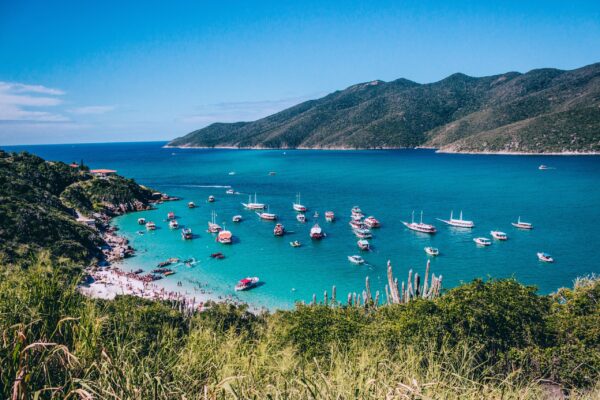
Outside of Sun Moon Lake JIJI Town
Sun Moon Lake is beautiful and famous. It is crowded at the weekend. It would be good to visit on weekdays. And if you would like a quiet and local town nearby, JIJI is a good choice. It has a wooden historical train station and countryside scenery, with a local fruits industry. Around the end of April to the beginning of May, the firefly season is also a good time to visit.

National Park in Taipei City
Yangminshan National Park is located in Taipei City. There are plenty of trails for a hike. If you have time for a day, it would be perfect to visit the city national park, where there are hot springs and volcano heat scenery . The public transportation is convenient; visitor can reach the park in one hour by bus from Taipei main station and Jiantan MRT station.

Waste recycling in Taiwan
For separate waste disposal, each city has a different way of recycling. Following the signs on bins is the best way to help recycling. Abandoned batteries can recycled in most of the convenient stores’ counter (7-11). If you have the chance to stay in a residential area, you will see the unique Taiwanese waste truck. The policy in many areas says that waste bags are not allowed on the ground, thus, the waste truck usually drives around after dinner time and plays Beethoven music to remind people to bring their collected rubbish to the truck.
Tourism & People
Taiwanese love to share their cultural diversity, not only Han, Hakka and Southeast Asian people living on the island, but also 16 Indigenous tribes in Taiwan. These different cultures also bring religious diversity – with a good amount of Buddhists, vegetarian and organic restaurants are easy to find.
Democracy and freedom are deeply ingrained in this young country. Despite or maybe because of the high population density, Taiwan is a very safe country with good life quality and hygiene standards.
Sustainability Recognitions
Brazil has 9 destinations featured in the Top 100 Sustainable Destinations 2021.
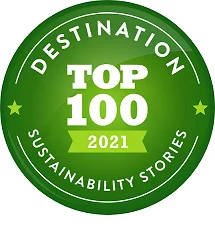
Other sustainability certifications can be seen here (English) and here (Portuguese).

Monique Chen |CEO of Sustainable Travel Taiwan
“We have various religions, 16 indigenous tribe, and also different people living in the island. The landscape is really various if you travel from west to east and north to south: you will experience city, mountain area and seaside in an hour. Biodiversity is unique: there are 13 national parks in Taiwan. Many efforts are being made to better preserve the heritage, including indigenous rights, and for the ecological conservation”.
Visit other destinations nearby?
Get in touch
Support
We are a multicultural, creative and dedicated team working to promote sustainable tourism. Join us in our fight against the climate crisis, single-use plastics and over-tourism!


